Headswarming
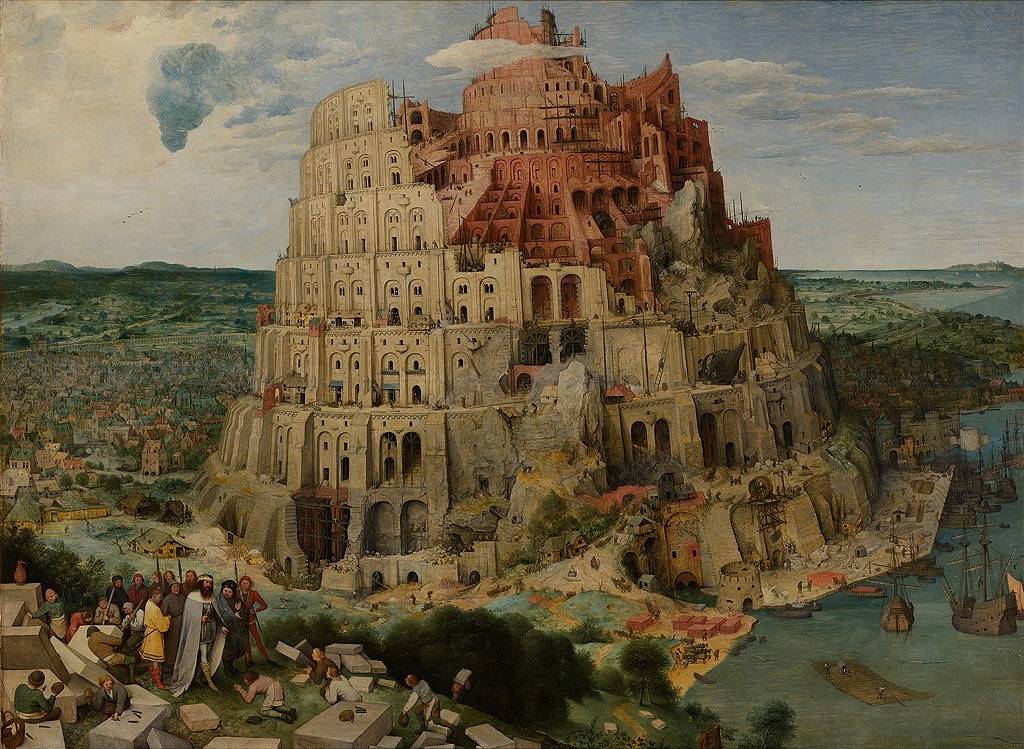
Pieter Bruegel the Elder: The Tower of Babel (1563)
"I already know what I want for Christmas."
When I was a kid, summertime featured plenty of boredom. As an adult, boredom's been more difficult to come by. As a budding HomeMaker, it's been essentially impossible to find. This summer, passing now into Fall, featured days filled to capacity with meaningful activity, perhaps the most dangerous possible condition for anyone aspiring to become an interesting or a creative person. I have lived this season in dread fear that I might become uninteresting after spending so many days refinishing doors. What could possibly be more boring than a man going on about the finer points of door refinishing? Any infinite work queue will do, though, to turn a decent fellow into a drudge. It's not the All Work and No Play Clause kicking in, but the lesser appreciated All Activity and No Boredom one. Boredom is probably an essential human experience. Those who fail to experience it seem doomed to an overly kinetic existence, a blur of a presence.
One must not only have leisure, but know how to use it.
LastFullDay
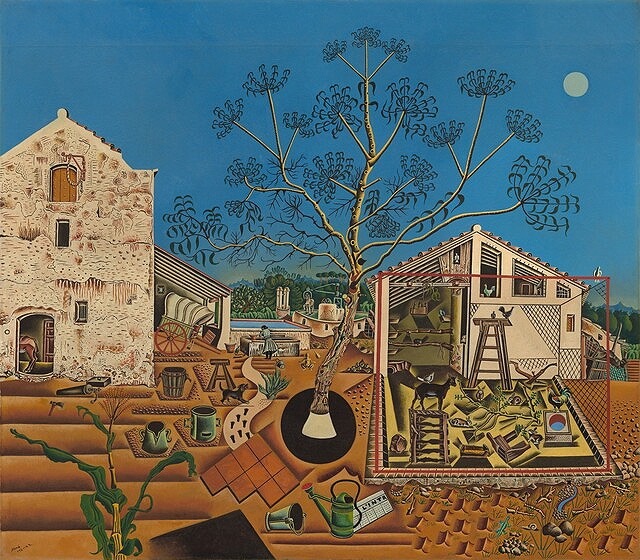
Joan Miró: The Farm (1921-1922)
"I never want to say goodbye …"
The end of anything tends to elicit a sense of loss, however much might have been gained from the departing experience. For me, endings introduce a beginning-over rather than a continuing-into sensation. Summer does not mature into Autumn, but falls down into it. The salad season where The Muse could and would mosey out to the overgrown tomato forest to bring back supper's salad seems to be ending with no adequate replacement. Tomatoes will soon taste of cardboard again and we will leave them lying in their false promises on produce aisle shelves. We'll resort to stews and braises and less frequently grill. I'm already noticing that the morning sun no longer blinds me at breakfast. Time has taken, over the last few weeks, to moving inexorably again, dragging me along unwillingly, insisting. And I've held full days as my final defense. As long as full days stood in the way of this latest inevitable, I felt safe. Today will be the LastFullDay and will leave me with only a flimsy half day of summer remaining tomorrow. I should expend this LastFullDay extremely carefully, though it will abandon me either way.
I experience what I've not accomplished more deeply than whatever I've achieved.
Hash

The building of the palace of Khavarnaq, from Nizami's Khamsah.
Painting attributed to the master-painter Bihzad. Herat, late 15th century
"HomeMaking might just be home."
Homemaking's iffy work. Always attempted 'on spec', it follows no fixed path. Largely driven by intentions, no guarantees accompany its effort. One scratches at the Earth without knowing beforehand what might sprout and grow from the effort. Each instance seems distinct enough to cloak expected results. Two months and change into our Grand Refurbishment, our home seems distinctly less homey than it did when we started our work. Of course our work's not yet completed and we do not know what percent complete we are today, as if that was saying anything. Percent Complete has always been one of those bullshit concepts which seem perfectly uncontroversial, yet it presumes as knowable innumerable aspects of a pursuit, rendering any response to the question, "What Percent Complete are you?" not worth the breath expended expressing it. Nobody ever knows. I do know for certain, though, that I've made a Hash of this HomeMaking so far. While some chance remains that we might one day finally realize the home we've so long aspired to own, it's probably more likely that we'll still be aspiring when we die, never having realized what we pursued with such earnestness.
Conservative columnist George Will concluded his Washington Post column this morning by saying, "For Americans, the pursuit of happiness is happiness.'
SecondSleep
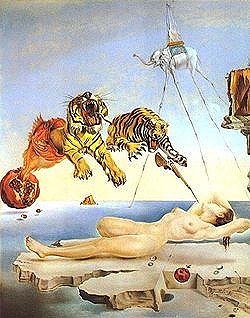
Salvador Dali:
Dream Caused by the Flight of a Bee around a Pomegranate a Second before Waking (1944)
"On weekends I dream my Second Sleep dreams with Max The Monster Cat kneading on my shoulder."
In centuries before industrialization and time regulation, when darkness and fire dominated every evening, people allocated their time differently than we do today. Then, most were, indeed, up with the chickens and down shortly after supper, but most maintained a second period of which they also made productive use. Most did not sleep twelve hours each night. They'd rouse in what we'd refer to as the middle of their night, get dressed, maybe snack or even go visiting neighbors. After two or three stolen hours, they'd tumble back into bed and catch a few last zzzzzzs before rising again with the chickens. They called that second snooze 'SecondSleep', and it's something we lost when we domesticated ourselves into nine-to-fives separated by commutes, when we abandoned the sun standard for time, and when we began staying up to watch the late news before bed.
That period between first and second sleep was more private than daytime wakefulness.
Tolls
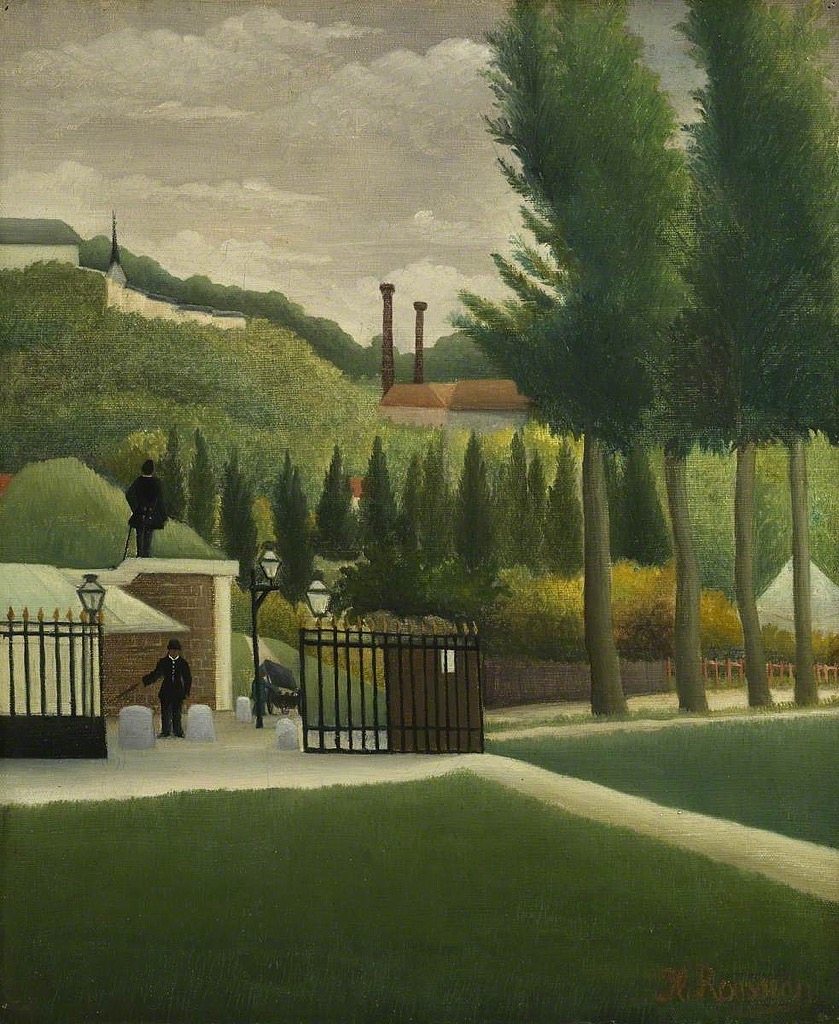
Henri Rousseau: Toll Gate (circa 1888-1892)
"The price of progress might not be my soul …"
If there's no such thing as a free lunch—and I'm not fully prepared to accept this premise—then it might follow that all human activity exacts some sort of toll or tax on the human engaging in it. Repetitive motion injuries have been widely recognized and humbly acknowledged. It seems as if half of the more common syndromes carry a professional designation: Coal Miner's Lung, Cyclist's Knee. The most dedicated come to wear their self-inflicted infirmity as a badge of honor designating their self discipline. The less fervent might use their wound as an excuse or a cautionary example, whining rather more than seems strictly proper or necessary. I, myself, maintain a growing list of physical complaints which seem to stem from our Grand Refurbishment work. Some hold no obvious connection, by which I mean that I cannot point to a specific event or action which resulted in the affliction, but each fresh wound appeared during the period in which I was engaged in Refurbishing work, so I classify it by association. I see them as a result of my engaging whether or not they actually were. I consider these damages as representing the Tolls of Refurbishing. I feel equally honored and embarrassed by their presence.
I noticed that my fingerprint no longer works as a security check when awakening my phone.
Woikin'
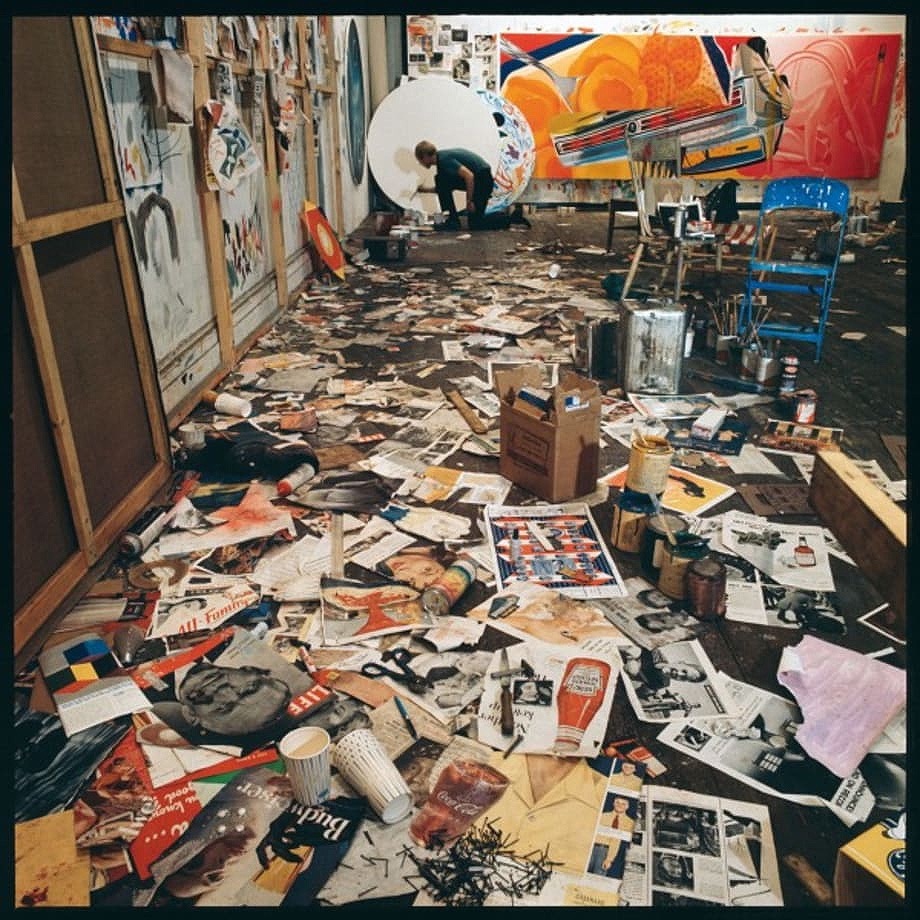
Ugo Mulas: James Rosenquist, New York (1964)
"I inhabit a perfect market featuring infinite supply and no demand."
I have been gainfully unemployed for so long that I no longer remember the sensation of 'having a job.' I have my work, of course. Who doesn't? But an actual job? I might have become functionally unemployable. I do not know why. It just seems that at some point, there was no demand for whatever I did. Nobody ever said anything about it. No dissatisfied customer ever protested my performance. I was just no longer working. Not retired. Not laid off. Not so much out of work, but more like employment abandoned me, leaving me to pursue my own work. When a form asks for my employer, I write in 'Self,' though I'm not actually my employer. My work employs me, but not because it pays me for my time. My work employs me because it holds my attention. Maybe next time I encounter that question on a form, I'll fill in 'my work' and see what happens.
I took a survey this week and encountered all of my questionnaire pet peeves.
Mindering

Paul Klee: Red Balloon [Roter Ballon] (1922)
"I've become my own DJ and audience."
When I'm painting, I can listen to an audio book, but painting's only a tiny portion of any painting project. Much more time goes to prepping, which tends to be noisy work, too noisy to allow listening to any audio input. Of course I could just finally cave in and buy a noise cancelling headset as I've threatened for years, but I'm learning to appreciate the selective availability of external entertainment and, much more importantly, I seem to be gaining a fresh appreciation for where my mind goes when denied distraction. I'll call that state Mindering. My mind wanders to the most curious places. A tune might dominate for a while, one selected from an impressive list, no justification given. Chattanooga Choo Choo accompanied me through two full Pop-Up Paint Shoppe days this week. I compose impressive essays while sanding door fronts. I relive scenes from my past and pre-live a few from my future. I engage in lengthy internal dialogues. My mind never stops chattering.
Those who engage in relatively menial activities seem to have the greatest opportunity to enjoy the joys of Mindering.
CodeTalkin'

Photograph by Edward S. Curtis: Cañon de Chelly, Arizona (ca. 1904)
" … probably won't ever come out and declare that he never did have a clue …"
During both WWI and WWII, the US Army signal corps employed speakers of Native American languages as so-called Code Talkers, for radio chatter conducted in their native tongues was absolutely untranslatable code for German, Italian, and Japanese code breakers. Code Talker transmissions were never compromised. Now, it seems each profession maintains a native dialect, the purpose of which might mirror the original Code Talkers', to transmit sensitive information without fear of translation. Painters, plumbers, carpenters, and carpet layers each employ certain distinct patterns of speech to cloak their underlying meaning. Good often means mediocre. Awful might mean excellent, but don't let that judgement go to your head. Our flooring supplier uses standard project weasel language which I recognize from decades hanging with Project People.
Project People maintain many deeply encoded language patterns which fall under the general category of Schedule Chicken.
MonkeyBars

William Holbrook Beard: For What Was I Created? (ca. 1886)
"Imagine how fortunate we feel …"
As the sun set last night, I called down into The Muse's Zoom® Lair to ask if she'd climbed up to the second floor yet. She hadn't. I implored her to get out there before she had to try it in the dark. She responded with the warmth of someone who'd been insulted by a suggestion. You see, we'd reached that point in our Grand Refurbishment when we could no longer just use the stairs to reach the second floor, where bedroom, full bathrooms, and showers reside. I'd erected scaffolding in anticipation of this time. Our Painter Kurt kindly donated his plank to the project. I used clamps and leftover trim wood to stabilize that plank between the flat front porch roof and the scaffolding, creating a pathway of sorts between the main floor-level front porch and the little door off the front porch roof deck into the second floor. It seemed plenty precarious so I'd practiced my ingress and egress a few times before the sun set, but The Muse hadn't. Yet.
She easily clambered up, puzzled at what my concern had been about.
Dooring
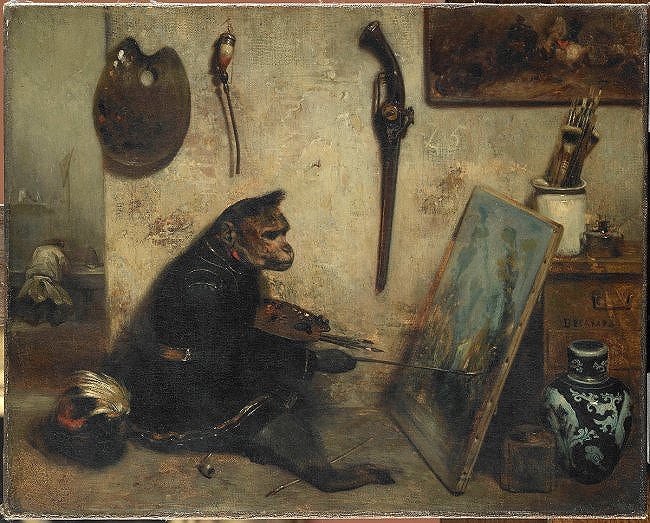
Alexandre-Gabriel Decamps:
Le singe peintre, aussi dit Intérieur d'atelier
[The Monkey Painter, also called Workshop Interior.] (ca. 1833)
" I will miss this work once I'm finished."
Six weeks ago, I posted what might now qualify as an introduction to the fine art of Dooring with a piece I called Doorable. In that story, I explained how I believe that the world is always trying to teach me and that I'm a reluctant learner. Kurt Our Painter and the doors themselves have been dutifully teaching me how to paint doors over the last month and a half. Nearing the end of this part of my contribution to our Refurbishing effort, I might have a few learnings to share. I'm not yet in any way an expert doorer, or whatever a door refurbisher might answer to, but I have finished, or, more properly, refinished, nineteen door fronts now, with only four remaining, and I've been noticing a certain facility emerging in my practice. I have a method of sorts in that I seem to be following more or less the same steps with each door front I face. I work much more quickly and decisively now, with few unforeseen discouraging events, which seemed common at first. I have my tools and techniques sorted, ready to hand. By the time I finish this work, I might never refurbish another door, for only five will remain unrefurbished in the whole place.
These doors have been teaching me.
'FraidSo
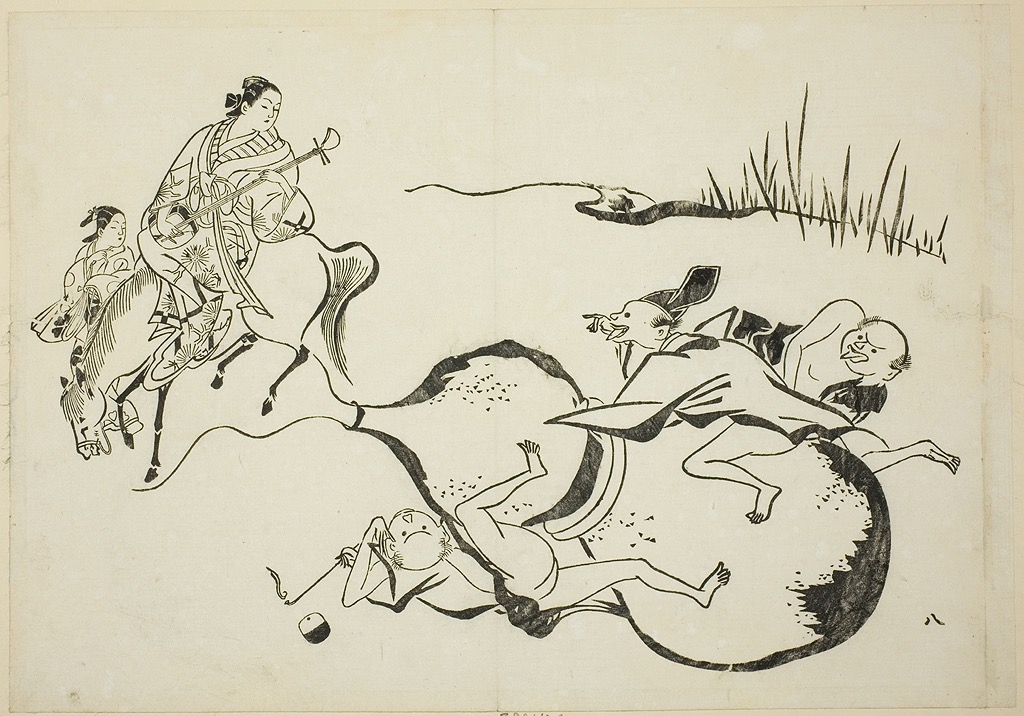
Okumura Masanobu: An Impossible Feat by Imaginary Men, no. 8 from a series of 12 prints (1708)
"If you meet a fearless being on the road, run for the hills in fear."
I find HomeMaking terrifying, which isn't really saying that much, since I find life generally terrifying, so it should naturally follow that I would find HomeMaking, being an integral part of my life, terrifying. I noticed again this morning as I walked along the upstairs hall, feeling my way through pre-dawn darkness, I heard myself whisper to myself, "I am afraid." It's not an uncommon comment for me to catch myself whispering, though I usually only intend this comment for my own ears. I no longer interpret this statement as an excuse to get out of doing something, for I usually feel my fear and choose to proceed anyway, a response I've grown to invoke, if only because it enables me to do things. If I avoided engaging in activities that terrified me, I'd be hiding in the basement, though basements, too, kinda fill me with dread.
Years ago, I stumbled upon a fine little book called Art and Fear (Art & Fear: Observations on the Perils (and Rewards) of Artmaking By: David Bayles; Ted Orland, 2001).
FirstRain
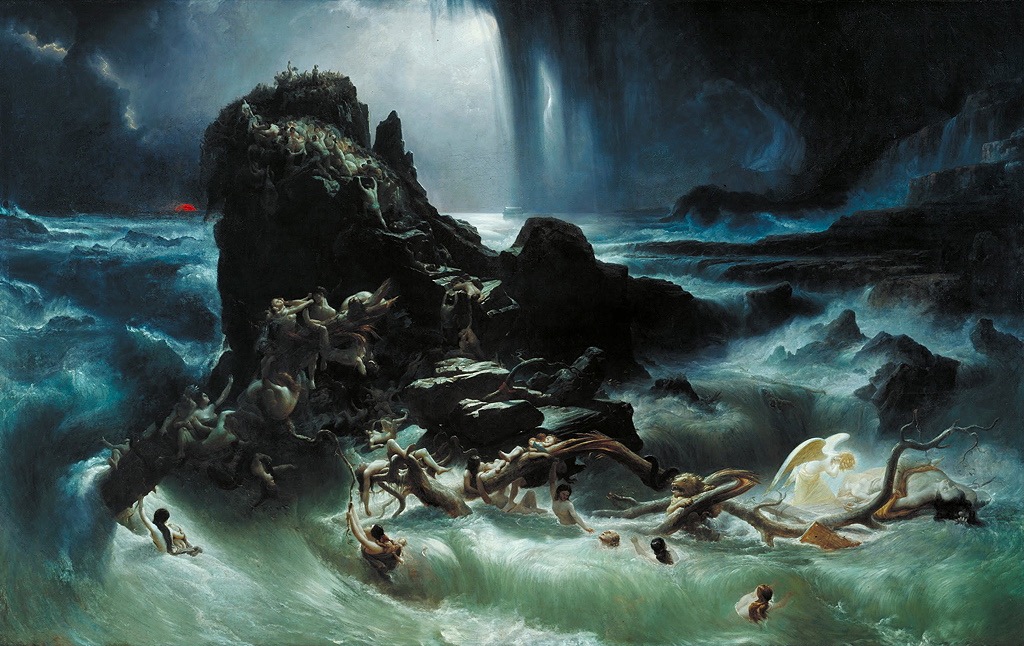
Francis Danby: The Deluge (1840)
" … find good reason to look back longingly …"
We hadn't seen any real rain—really, no rain at all—since we'd returned to The Villa Vatta Schmaltz in late March. We'd seen what might have passed as a passing shower had it done more than briefly dampen the pavement before quickly evaporating off. One hundred and seventy days of extreme drought, also one hundred and seventy days of SettlingInto and HomeMaking, more than half a year. I'm tempted to call that period an era, because it seems as though it was. One rainy day seems to have broken a persistent spell, one during which I could not tell where its edge might lie. Those days seem to have been suspended in time and place, framing our return to this most extraordinary space, like an extended overture setting the stage for whatever follows. It seemed endless from within it, sometimes interminable. During the hottest summer days, we seemed especially cursed, but mostly it seemed as if we had been especially blessed. I knew it could not last but I didn't want it to end then, or ever. It's over now.
Oh, I expect an extended Indian Summer to work on scaffolding, tidying up a few surfaces and windows.
UnderDoing
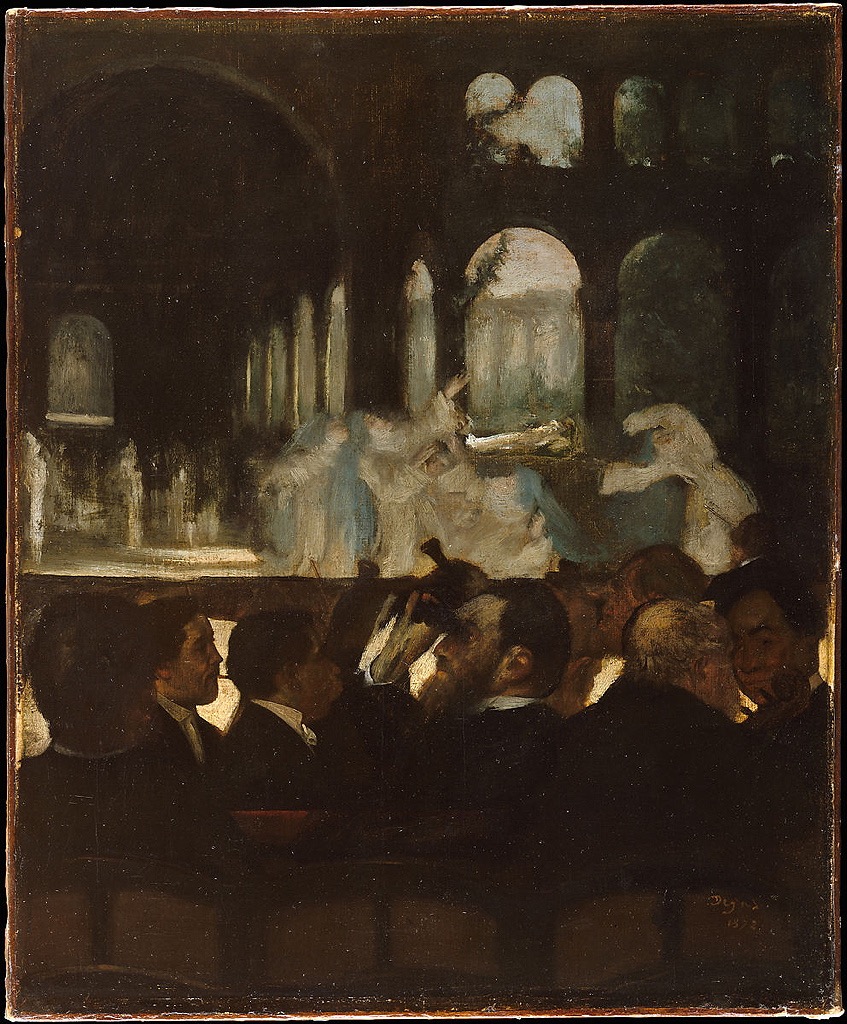
Edgar Degas: The Ballet from "Robert le Diable" (1871)
"I seem to work just to disappoint myself."
We've been working late this week, our little crew usually still here after six most evenings. This might have been a natural reaction to having taken Monday off for the Labor Day holiday, or maybe we sense a major milestone and pivot point approaching. Maybe neither or maybe both. Effect does not require a discrete cause, but seems to beg for one. Our downstairs, main floor work will soon be finished. The planking for the second floor is supposed to be here next week, but has not yet arrived. Joel Our Carpenter reported that he has a few days' fill-in work if our progress stalls. Kurt Our Painter has plenty to keep him occupied, his work necessarily trailing behind. Joel's the finish carpenter, but Kurt actually finishes what Joel just gets started. Kurt says he's used to that.
I wake up at my usual obscenely early hour, but with a difference of late.
Intos
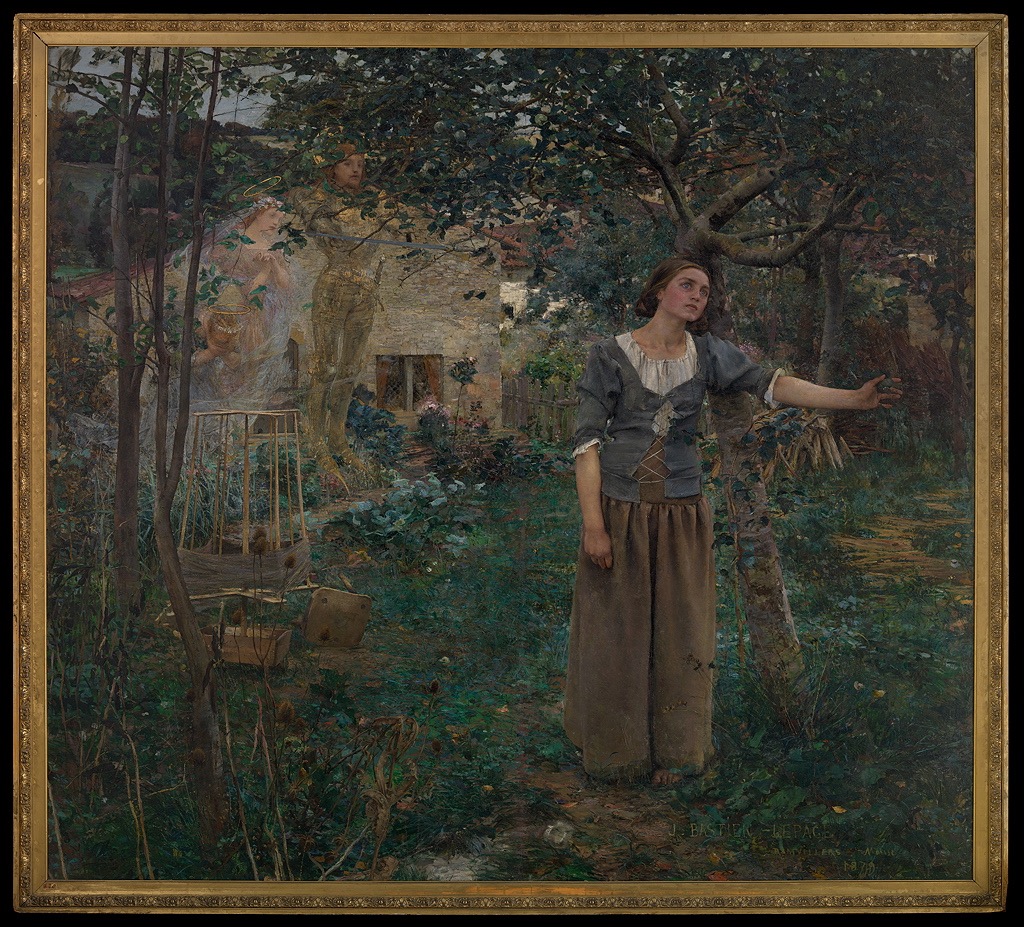
Jules Bastien-Lepage: Joan of Arc (1879)
"I glance up and just notice, then, that I've turned Into someone else."
I feel humbled as our grand refurbish finally starts turning into something more than aspirations. Today marks seven weeks since Kurt Our Painter first appeared here and we began poking around the edges together, working toward a largely undefined center. The Muse and I had just settled on paint color as if that amounted to much, which it did but also did not. Paint color served as the starting point and will become one lasting effect of having done this work, but repainting was not ever the purpose of this refurbish. It served as more of a premise, a story capable of holding many conflicting elements, and in many ways repainting has served as a false premise. Yes, every square inch of much of this house will have been repainted by the time we're finished. Considerable unpainting will have been completed to accomplish finished, too, and more time will have been spent prepping than painting. The labels we give our work materially misrepresent it. Our aspirations still seem vague from today's perspective, so much closer to done than when we started. Much fuzziness remains, though we're not panicking, hoping to become more certain. We seem to have become more comfortable with not precisely knowing and letting results emerge.
The most dramatic results thus far have also been the most subtle, as Intos tend to emerge quietly, without much fanfare.
DustToDust
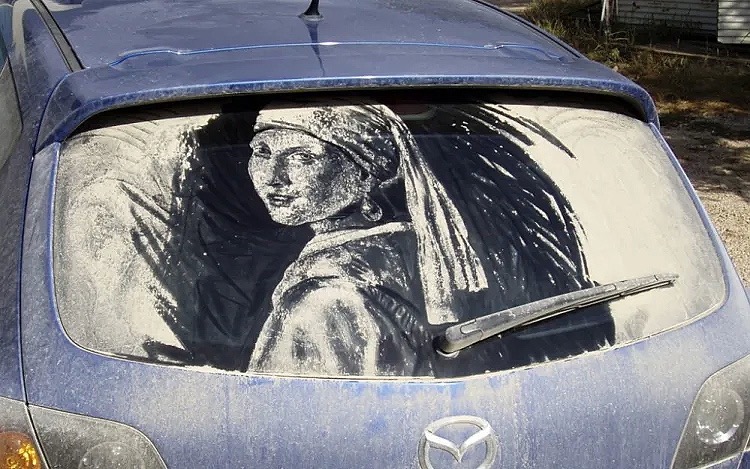
Scott Wade: Girl With A Pearl Earring, the famous Vermeer’s painting, rendered in car window dust (circa 2016)
" … one cannot successfully repaint anyplace while suspended within a blizzard of swirling dust."
Refurbishing remains first and foremost a dusty undertaking. The act of buffing up removes tarnish, which I think of as metastasized dust. Removing carpet, as I've previously mentioned, reveals a layer of fine dust more resembling talcum powder than dirt. Further, the whole house gets covered in a fine fresh layer of the stuff, even the HVAC system and its ducts. Countertops gain a slick surface as if lightly oiled, but that's dust lubricating. Even my body carries a fine layer of it. My fingertips slide over my thumb top as if they were teflon coated. We've sworn to just live with it until the project's finished. There never was any point to trying to keep up. The vacuum fills up until its tank weighs as much as a five pound bag of sugar but the floors and walls remain just as slick with it as they were before we began. We tell ourselves that we'll clean from top to bottom as the last act of this project and that might even happen.
Both The Muse and I grew up in places prone to dust storms.
LongWayHome
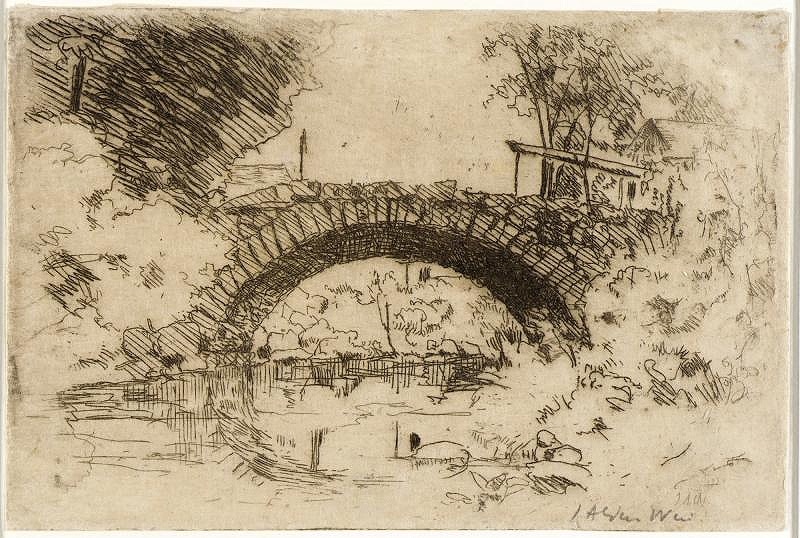
J. Alden Weir: The Stone Bridge (ca. 1887-1893)
"Anything to delay arrival …"
Two hundred and forty-four miles separate these two worlds, the one I was raised in and the one I came of age in. All my life, I've traveled between these two points more than between any two other. Even those years where I commuted weekly to work in Silicon Valley barely dented this enduring trajectory. Even leaving the area, moving back east, and spending years away didn't change how I related to my world. Home came in two flavors. There was home and then there was back home, each authentic, neither sufficient all alone. One home held my stuff, the other, my roots. Neither place made any sense without the other. I suppose that it's this way for anyone who moves away to make their life. One can move out but not permanently away, or at least I never found a way to permanently stay away. I was always headed home, either to where my heart was or to where my stuff resided. The two states rarely coincided, or didn't until The Muse and I decided to move "back" to my hometown and we bought The Villa. Even then, my son and grandkids came to live at precisely the two hundred and forty-four mile marker from our new home, with home taking on a fresh double meaning: where my heart resides and where my progeny lives.
We migrate between these two homes about once a month for now, taking a long weekend to visit family and perhaps a friend. It's a predictable route.
Justing

Gaetano Gandolfi: Allegory of Justice (1760s)
" … present and damned well worth counting."
The word occasionally appears within the normal flow of conversation and to my ear, suspends the show for a moment. Back in the days when I could still eat in restaurants, I might show up at a hostess stand seeking a table, and be greeted with one of the most discouraging words in the language. "Is it just you, then?" No, I'd reply, it's not just me, it's ME in all my glory! "Just" just sounds so disappointed! Sorry to ruin your day. It's just me today.
We each engage as judge and jury over our proceedings, passing judgements over what we encounter.
OffDays

Gustave Courbet: Young Ladies by the River Seine (1857)
"HomeMaking, like breathing, doesn't come with time off for good behavior."
Unlike gainful employment, HomeMaking does not come with days off. It's a twenty-four/seven sort of occupation, with adequate responsibilities to entertain any three individuals for just as many hours as they'd care to contribute. Further, these are not appreciative hours but largely anonymous ones, where if one's properly engaged, no one will notice. Still, occasionally, some respite seems necessary if never wholly justified. Rather than taking a day off, I experience an OffDay. An OffDay begins like any other, though perhaps gravity might work a little better than usual when the alarm clock rings. I'm up and moving, completing my morning rituals, writing. I'll be done about the time The Muse's alarm wakes her. My breakfast will have been warming. I set right to it, shave and shower, then slow down a bit. I might lay down, I tell myself, to digest my breakfast, then doze. An hour later, I still haven't gone anywhere and am still feeling dozy. I allow myself another half hour until those short cycles accumulate into taking the whole morning.
I won't usually allow myself a whole day off when an OffDay comes calling.
UnrelentingDecency

Heinrich Aldegrever: Temperance. From: The Virtues Production (1552)
" … gritting our teeth in utter embarrassment for them."
The Muse returned deeply upset from her Friday Exceptional Women breakfast. She'd heard stories of incivility at the Democrat's Fair Booth. Apparently, Republican-associated rabble had taken the opportunity to unleash venom at their presumably evil opponents there. The Muse was justifiably worried. If some people felt comfortable verbally assaulting without provocation their presumed opposition, how could we possibly avoid a civil war, or an uncivil one? She brought this question to my Friday Zoom Chat, and we mumbled over it.
It's an old question. If the opposition seems unconstrained, should we mirror their lack of discipline in order to win or must we hold ourselves to higher standards?
SandMan

Michael Taylor: Boy with Apple, a faux painting made for the 2014 film The Grand Budapest Hotel.
" … a substance expressly designed to undo the past with an unskilled hand."
As I finished sanding the last baseboard to bare wood, I caught myself having insisted upon the lowliest role again. In the grand pecking order I've constructed within my head, our painter Kurt and our carpenter Joel both hold lofty positions due to the experience and skill they bring to the effort. Even The Muse, who mostly engages in abstentia while working remotely in her Basement Zoom® Lair, holds a loftier position than mine, for she's the designer and vision keeper. She's the one everyone else waits on before they proceed. Me? I'm the guy who semi-reliably removes nails and mostly successfully tries to keep track of doorknobs. I also empty garbage and sand. I've been sanding a lot lately. Once we realized that we'd need to reclaim and alter all the existing door and window trim to satisfy The Muse's vision for them, it became necessary to sand all those boards to bare, to rid them of every trace of a hundred and fifteen years of accumulated past. Five coats for some pieces.
Rather than divert paid assistance toward such a lowly assignment, I volunteered.
TheGrip
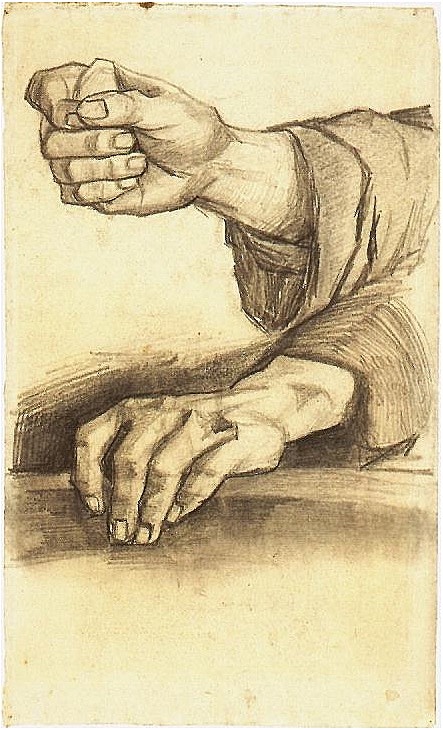
Vincent van Gogh: Two Hands (1884 - 85)
"I must be overreaching or I don't feel as if I'm living at all."
I become a sawyer when I'm sanding a board clean of paint. Sawyers stood in deep ditches and worked their long saws up into logs laid across, their partner sawing down, showering them in sawdust. Each one seven feet in length and smeared with a variety of coats, I challenge myself to clear one in a single pass without turning off the sander or loosening my grip. Forty-five minutes later, I drop a freshly cleaned board onto my padded saw horses and I loosen my grip, TheGrip. My hand lost feeling long ago under the incessant vibration of the humming little machine I held in my palm. I'm liberally covered with fine saw and paint dust the consistency of talcum powder. I sweep off the finished board, a hundred and fifteen years old and fine-grained, looking freshly milled, and add it to the finished pile. I have at least a half dozen more to finish today to avoid holding up forward progress installing window and door trim. I hold a worthy purpose in my life at the moment. I hold it with TheGrip.
It's not every day or every time when worthy purpose visits.
Changeling

Henry Fuseli: Der Wechselbalg (1781)
"She owns her choice …"
Granddaughters have by long tradition been the most troubling of relatives. Grandsons can reliably become meatheads without surprising anybody, but granddaughters seem mercurial, capable of material changes without any warning. Our GrandOther proves no exception. The Muse and I had noticed since we returned from exile that The Other had changed, with less energy focused upon sugar, spice, an everything nice and much more on puppy dog tails and worse. She seemed much more capable of morose and mouthy, often without apparent regard to who her words might wound. She seemed defensively haughty. We figured it might just be evidence of a phase or something. Aren't eleven year olds allowed phases? My duck feathers mostly shed her venom without it wounding me much. About the fiftieth time a granddaughter proclaims that she'd rather be dead than be with me, though, the story gets to feeling old.
And so it was that I agreed to pick her up after the second day of the new school year and transport her to The Villa where she could wait for her dad to get off work and fetch her home.
Walker

Paul Gavarni: Man Walking (circa 1852-1866)
" … winning non-existent races, going places."
Back in the seventies when I began my second career, I still believed in the predictive powers of assessment surveys. Often advertised as psychological tests, whatever that might have been (which they weren't), they claimed to be capable of assessing what sort of a person you might be, for purposes of matching natural inclination to specific job situations. An employer, for instance, would not want an egghead in a meathead job because the egghead might over-think everything rather than mindlessly comply with directions. A popular "tool", as they were referred to, designated some individuals as Ds, or Drivers. My primitive conception of leadership at the time encouraged me to think of the Drivers as the real leaders and the others, the nurturers and philosophers and analysts as somehow further down the pecking order and therefore not really leading. I found that if I answered the survey questions not as I knew myself to be but as I aspired to become, I could easily score as a nearly perfect Driver and thereby reinforce my primitive notions of leadership while also satisfying myself. I reported to a wiley boss who saw right through my ruse without challenging me on it. She figured, I guess, that I'd best teach myself different if I was ever going to amount to much.
And so I fancied myself a Driver.
Jerry

Rembrandt's stolen masterpiece: The Storm on the Sea of Galilee (1633)
" … a long lost friend forever."
I received last night the news of the death of a long lost friend. Jerry was lost when we first met and to my mind never really managed to find himself, though he would have doubtless disagreed with that assessment. I considered him for a time a dear friend before he became a feared one, and his story might serve as both cautionary and explanatory, for it carried a not uncommon theme of the time. His story speaks to the deeper cost of war and a paradox of justice, where punishment sometimes proves more punishing than any original crime warranted.
When Jerry was seventeen, still in high school, he was charged with stealing some records from a local drug store.
Roostering
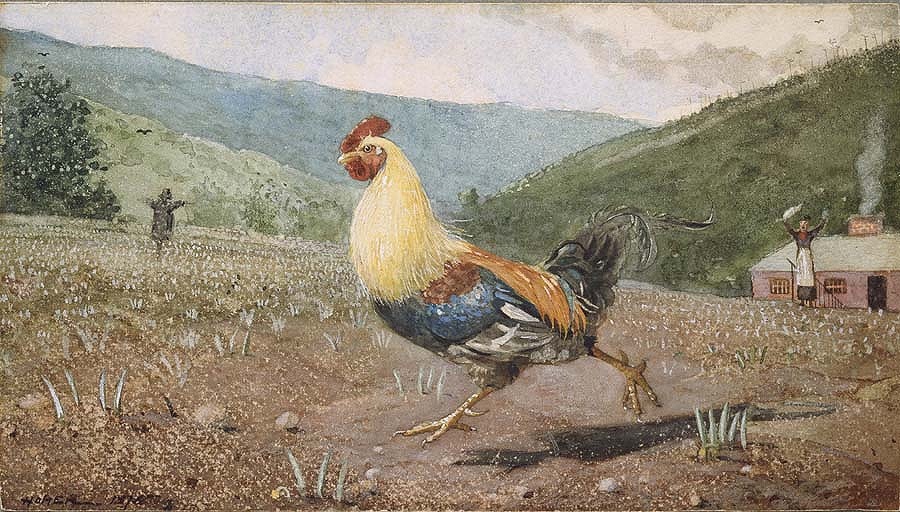
Winslow Homer: The Rooster (1876)
" … my Roostering's finished just before The Muse's day begins."
The neighbor's rooster starts crowing two hours before dawn, every blessed morning. I'm almost always already up by then, anticipating my day, finishing my writing. Both that rooster and I seem to possess an active anticipation, he, an internal clock, and me, a sense that I cannot quite grok. His kind served as the original alarm clock. My kind just woke up earlier than almost anybody and set to work. It might be that the work I do cannot be performed in the full light of day, but can only emerge in faint light or anticipating light, only out of near darkness. Some might insist that the rooster's cursed to never enjoy a full night's sleep, but I suspect that the rooster would disagree, as would I, for enjoying sleep seems to require having finished working and never entails avoiding it. One might fitfully attempt to sleep with unfinished work, but probably won't enjoy it.
Lately, as my life's focus has shifted from the etherial into the more practical, my early morning ritual has seemed less important, less urgent.
DIY

Mihály Munkácsy: Yawning Apprentice (1869)
"We're none of us islands of skill …"
The Muse, who serves as the grand designer of our great refurbishing effort, makes most of the decisions because she holds the vision. I'm not just trailing behind doing her bidding, but I'm careful what I initiate, to make sure that I've communicated what I'm attempting. It's genuinely shocking how often I find that we have not reached agreement or that my notion was somehow unconscionable once I mentioned it. She chose the color after I'd set up and painted the boxes to demonstrate how they played together. I'm learning how to become indifferent to many details. Color's not my remit. Neither is style. I contribute my part without trying to take much in the way of credit, either, for I'm not doing very much by myself or even for myself. I think of myself as bringing a certain flare, a studied style of execution, often so subtle that nobody should ever notice its presence. My doors can't rival those Kurt Our Painter finishes, but they're good enough not to stand out as amateur productions. Even Kurt consults with me, as I continually consult with him, both of us serving as if not servants, then apprentices to some larger context, one only The Muse understands.
That's not to say that she's not persuadable.
GreatGoodFortune

Li Gonglin: The Classic of Filial Piety (circa 1085)
" … had we been as prescient as the venerable I Ching or a decent Tarot reading, but we weren't."
Earlier in my careers, I was forever trying to foresee what was coming next. I consulted The I Ching and various forms of Tarot, each of which use language unique to them. The I Ching, for instance, was forever speaking of GreatGoodFortune when indicators suggested a likely positive result. Eventually, though, foreseeing came to feel like taking a blood pressure reading in that it doesn't work if taken too frequently and might be accurate only to the degree that it's rarely taken. One can live in the future and miss the present just like one can lose their present in their past. In times of peril or uncertainty, I'm still not above or beyond trying to sneak a peek through the veil, but I most days proceed forward without attempting to peer around upcoming corners.
All that said, I'm presently experiencing a prolonged period of extremely GreatGoodFortune, one ingredient never ascribable to talent or skill.
Consequent
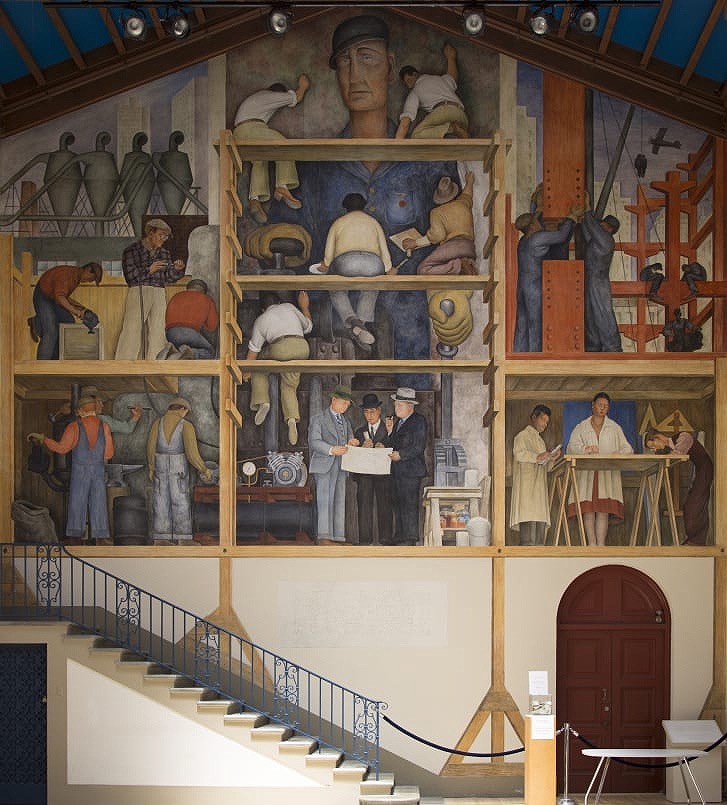
Diego Rivera: The Making of a Fresco Showing the Building of a City (1931)
"If we can't make this fun, they won't find it worthy."
The early effort seemed unfocused for it sought first to figure out what needed doing and in what particular order. I contend that there never was any orderly way to determine order. It's inherently messy business. One dabbles at first, poking here and prodding there until a rough order emerges. Some rework usually results, with luck, little, without, perhaps much. We have been inordinately fortunate on this refurbishment effort, which I take as a sign that we're engaged in a right and proper undertaking. It seems to me that if I'm engaging in right work, good fortune naturally accompanies me. Great good fortune, which characterizes what we've been experiencing, seems as if a blessing from The Gods or something. Little has discouraged us so far. It's been Kurt Our Painter and I, with me struggling to keep up with even our modest initial pace. Once Joel Our Floor Guy (he's actually a finish carpenter) arrived, our previously languorous pace exploded.
I'd noticed this same effect on many of the projects with which I'd once led and consulted.
BackOrdered
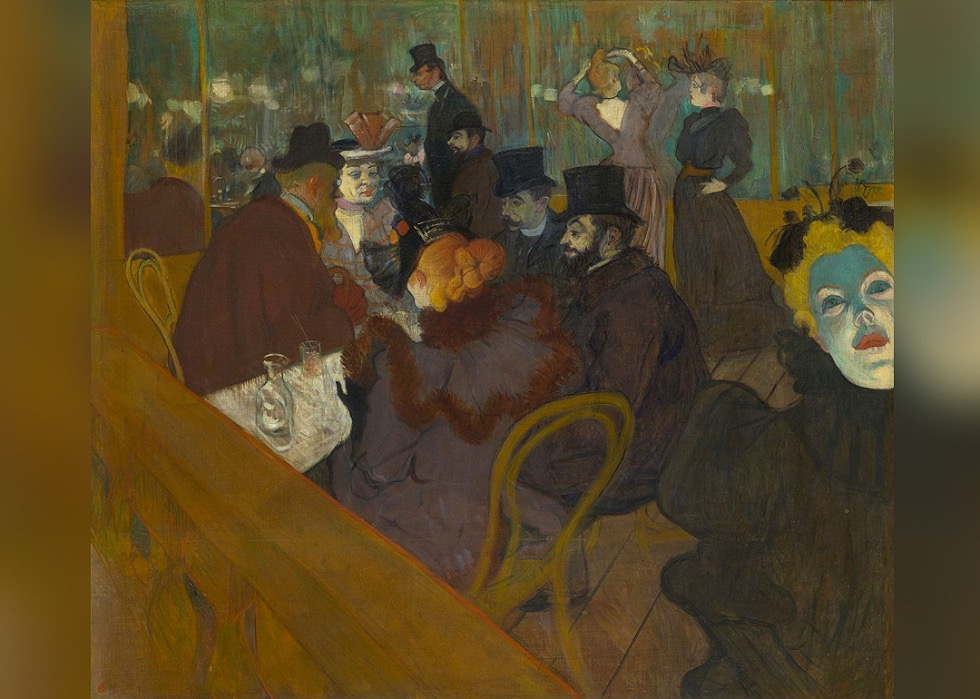
Henri de Toulouse-Lautrec: At the Moulin Rouge (1892–95)
"I have been an unworthy beneficiary …"
I told The Muse that her birthday poem was back ordered, probably on a container ship held offshore at Long Beach until a dock opens up and then dependent upon a driver being available to transport it from there to here. Who knows when it might appear? It's been a queer year, and especially odd for refurbishing this old place, since supplies have been in historically short supply. The glass guy reports shortages of glass, for instance. The paint store had six gallons of the base I needed when they should have had hundreds, here in the middle of high painting season, and even then I'd had to upgrade to a more premium version. The doors and windows we ordered in April might not arrive here this year. If they arrive earlier, the installers are over-scheduled and unavailable at any price. Everything's in short supply. I bought three preemptive gallons of trim paint I didn't quite need yet to prevent running out in the future and shutting down our refurbishing efforts until who knows when. Nobody knows. We're all torn apart here and cannot wait long to achieve complete enough to close up for fall and winter. Closure's also back ordered.
My creative spark seems on back order, too.
Sublimating

Wojciech Siudmak: Door (1999)
" … probably something even better!"
When I was in my early twenties, I took a job as a pot washer, the lowliest job in the kitchen. My work station was in the grimy basement beneath where the chefs reigned, adjacent to the service elevator which brought me a continuous stream of freshly-ruined pots and pans. I had not taken the job with the aspiration of advancement. I was at the time convinced that I was a songwriter. I took the job to support my songwriting, which I firmly believed would eventually bring me fame and fortune. That job served as a medium and not as an end unto itself. It turned out that I had a penchant for the work. I declared myself The Pot Wizard and challenged all comers to try to dirty a pot in a way I could not conquer. Nobody ever did.
I learned more while washing pots than I learned at university.
Changing

François Boucher: The Interrupted Sleep (1750)
"I don't need a world or a home that doesn't seem to need changing …"
While painting yet another door front yesterday, I started thinking about all the changes The Muse and I have visited upon this old place over the twenty years we've owned it. Once we complete this current refurbishment, we will have changed flooring in every room except the basement's, every room's wall and trim color, removed and refinished or replaced every window, rebuilt the back porch, stripped the exterior to bare wood and repainted it, torn off four layers of roofing and replaced sheathing as well as roofing and gutters, repointed the chimney, replaced the front steps and entry walk, replaced half of the front retaining wall, replaced the heating system and added central air conditioning, repainted the surrounding fence, and extensively reworked every garden. We will still have a list remaining of future changes to make. As near as I could see from my pop-up paint shop, we had been Changing only superficial surfaces, not the house. It would look like a falling down wreck had we not completed those efforts, but they changed little. It seemed to me while leaning over that door that we had been more putting the place back into order than changing anything. Time had attempted to change it, maybe entropy got involved, and we just restored it to some state closer to its original condition if not precisely into the same configuration.
When removing the regrettable wall-to-wall carpeting, I found the place's bones lurking underneath.
Eldering

Rembrandt Harmenszoon van Rijn: Bust of an Old Man with a Beard (circa 1630)
" … mending doors might teach me all I need to know …"
I went from being a man of modest middle age to an elder in a single day, the day I turned seventy, a day which might well have lived in infamy as long as it lived, which was the usual brief twenty-four hours. How should I have responded? I very cleverly pretended that nothing had changed, but only because nothing had changed. I didn't need to pretend because I couldn't see any difference between who I'd been the night before and who I found in my skin the next morning. Yet there I was, clearly within elder territory but without a clue about what I was supposed to do to fulfill my new role's responsibilities, which, I note, were foisted upon me without my consent, just like middle age's had been foisted upon me, and fatherhood's, and adulthood's, even teen-age's. I know how this works. It starts with no discernible difference and ends in denial of even the more obvious changes, a slow fading forward, a one-way road toward oblivion.
The older, the more precarious the balance, the more conservative one becomes.
Easy

Raphael: Detail of Pythagoras with a tablet of ratios, from The School of Athens. Vatican Palace, Rome (1509)
"I'm not working myself to death here, but working myself to life."
Since I started working on this latest refurbishing project, I've received many well-meant messages asking me to not work too hard, wondering when or if I was planning on taking a few days off. I've mostly left those messages unanswered, as if their questions had been rhetorical, because I had no idea how to even begin answering them. For me, days off usually come as the result of some injury or infirmity and not for the purposes of recreation. I look through my garage and notice that I own none of the usual recreational equipment common to a fellow of my age and social class. No golf clubs, heaven forbid. No tennis racquet, thank heavens. No basketball. There's an old baseball mitt in there somewhere in the unlikely event that I find someone interested in playing catch. That hasn't happened in twenty years or so. All those years in Colorado, I never once felt in any way interested in skiing or fly fishing or mountain biking or white water rafting or parasailing, or any of the innumerable other ways people engage in recreation there. I don't have hobbies, either.
I do have my work, which has long been my life.
Outventory
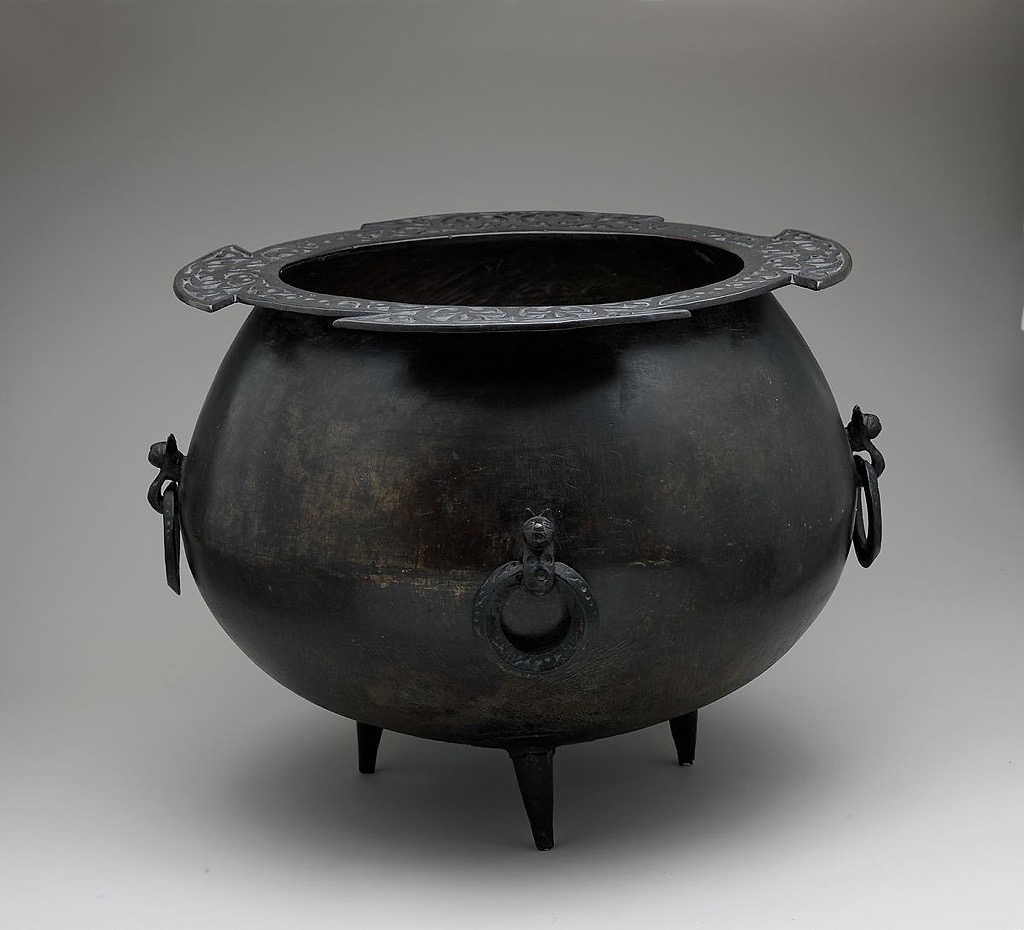
Unknown, Cauldron (mid-15th century)
" … both my product and my reward."
I've lately been seeing a lot of writing about the downsides of openness and transparency, both long touted as unconditional goods. Nobody really needs to know most of the picky details about any other. I do not, for instance, care to know what you really think about anything. I much prefer polite pseudo conversation to full disclosure confession. I'm fine with the persistent illusion that you're fine, just like you say when I ask you. I'm good if you think me a generally decent fellow, not given to unruly excess or extremist ideologies. You can think whatever you care to think about me as long as you do not expect me to live up to your fantasies about who I am. I have been mistaken for many things in my life. I have likewise been recognized for precisely who and what I am on multiple occasions, each surprises. We seem to so easily slot ourselves into some role or persona that we might not notice when our halos slip sideways a little. We rarely seek to set any record straight. This morning, though, it being the morning of my seventieth birthday, I intend to attempt to take a little public inventory of what I've managed to make of myself, with, of course, The Muse's generous help.
I eat beans for breakfast.
Achings

Benjamin West: The Expulsion of Adam and Eve from Paradise (1791)
"I've lately been spending my days making fresh Achings …"
I measure progress in aches and pains. A fresh and novel twinge in my back means that I must have done something different yesterday, something to engage a part of my body my earlier activities had not. Through the carpet removal period, a reliable set of complaints followed each day's work. Some of them evaporated beneath a shower, but most hung around at least long enough to see what we were having for supper that night, and a few would spend the night, cuddling right up close as I fell into my early bedtime. A few of my oldest friends wake with me each morning and remind me that I'm still not quite as young as I used to be, thank heavens. I remember times when I could lift and toil all day without carrying away even the tiniest little infirmity. Now, I barely need to think about engaging and my lower back knots up a little in anticipation. I tell myself that I'm alive and alive feels like twinging, it's eventually a welcome and unresolvable Aching, equal parts longing and savoring.
This refurbishing effort has been teaching me to revere my Achings.
Tiling

"The Good Shepherd" mosaic in Galla Placidia mausoleum.
UNESCO World heritage site. Ravenna, Italy. 5th century A.D.
" … one blank space which allowed shifting those tiles into any order."
We refurbish a mosaic featuring movable tiles. We shift our possessions, which serve as our mosaic's tiles, from place to place, room to room, as we prepare each space for what will have to pass for transformation this time around. We emptied the entry hall first, a modest push even with the piano. Everything easily shifted stage right into the front portion of the living room, the once and future music room, currently storage only frequented by the cats, who've found nests among the warren of boxes. That room's along the only remaining passage through the house, a narrow bridge between kitchen and front door. It might soon be easier to just go around the house outside.
The upstairs hall went next, stripped of carpet and baseboards, light fixtures dropped, doors removed from frames, then each room in turn, five in all up there, four of which have been repurposed into either fallow space awaiting baseboard removal or storage space holding everything from other rooms.
ToldYa

Coloured lithograph by R. Carrick after Lieutenant James Rattray:
Men in the decorated palace of Shah Shujah Ool Moolk, Afghanistan (c. 1847)
"Maybe I was only trying to tell myself but couldn't listen."
As of this writing, we have entered the ToldYa Phase of the nearly two decades-long conflict in Afghanistan, a discretionary conflict we chose to begin then lost from the outset. We fed this conflict for longer than any other war in the history of this country, which says something about dedication and commitment, though little about reasoned judgement. One could speculate that this outcome—the country overrun by Taliban forces we and our allies were only ever able to keep at tenuous bay and us humiliated, was the originally intended outcome of the conflict, and that creating the conditions which led us and our allies to invade that country were the true purpose of the infamous 9/11 attacks. It wouldn't have taken a genius to predict that our response to that insult might easily encourage us into some of our historically infamous self-destructive behavior. We'd done it before in Vietnam, Panama, and Granada and would do it to ourselves again in Iraq, even while still in the middle of our "adventure" in Afghanistan, even though The Soviet Union and The British Expeditionary Forces might have already successfully demonstrated our likely folly in engaging in what we euphemistically referred to as "nation building" there. We produced an occupation, never a nation.
I'm not suggesting that had the conditions been different, we might have managed to encourage more permanent good, but the world was never different than it had always been, regardless of the insistences of people who probably knew better but could find no more convincing argument to engage.
SceneQuesting
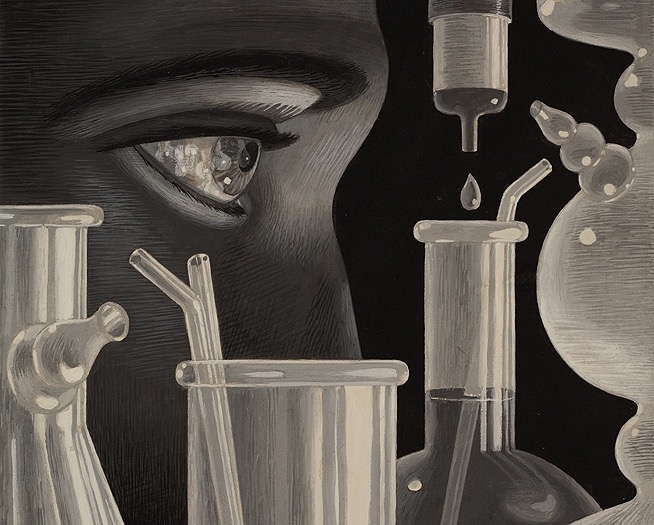
John R. Armstrong: At Your Service (1940s)
"I only know for certain what I haven't found for certain yet."
I catch myself fussing over more than contributing to our refurbishing effort. I seem to need to play through alternative scenarios before choosing if not the best of them, at least a less-worse one. To us unlearned and unwashed, the natural sequence of tasks seems at first mysterious. I might be able to envision a task as how it should appear when completed, but that end in mind does not define the sequence of actions necessary to produce that end state, and there seem to be an infinite number of alternatives from which to choose. I feel fairly certain that if I can only imagine one way to skin any particular cat, that my narrow imagination probably means that I have no business skinning that cat yet. I might grant myself permission to start skinning only after considering a few alternative scenarios for sequencing the work and choosing if not The Best, at least a less worse-seeming alternative. Refinishing one door, the sequencing hardly matters. Plan on refinishing a dozen, and a process emerges. Queues appear: untouched, prepped, primed, finish coat one, and finish coat two. The need for storage space and its availability limits possibilities. So do the number of pairs of saw horses and wait time between drying coats of paint. A complex set of choices quickly emerges. These choices comprise the bulk of what I fuss over in lieu of actually contributing to our refurbishing effort.
I suppose that my fussing might eventually add some value, though if I was drawing a paycheck from this work, I'd expect my employer to be bothered by how much effort I seem to expend while laying down with my eyes closed.
MartianLight

Edvard Munch: The Scream (ca. 1910)
"I'm seeing with my hands …"
In ordinary times, The Muse and I would have plotted a day trip up into The Blues to pick wild black currents which grow in profusion along icy streams which feed into the Tucannon River. This year, that whole area has been cordoned off due to extreme fire danger. That country's on fire. The trail we walked back in March just after we arrived "back" home, searching for morels that were not there due to record drought, might have burned over again. It had burned a few years back. Down in town, smoke obscures even the rumor of sky, even threatening the concept of up. Horizons fade into similar nothingness. The usual view of the foothills from our back windows overlooks nothing but haze, with no hint of any proximate elevation. The heat which has been sitting on our faces for six weeks continues undeterred and perhaps encouraged by the poor ventilation.
My door and window refurbishing shop, set up in the driveway beneath a pop-up canopy, swelters after ten o'clock.
Repurposing

George Julius Poulett Scrope: Artist's impression of the eruption of Mount Vesuvius in AD 79, depicting what that eruption may have looked like. Lightning is depicted around the rising column of ash and gas. This eruption produced massive volumes of pumice.(1822)
"We could always use the wishes coming true."
We are not so much remodeling the Villa Vatta, but Repurposing it. I learned from a note scribbled on the back of some wall-to-wall carpet I removed that the middle upstairs bedroom had at one time been referred to as "the girls' room." Carpet replaced with vinyl planking, that room will proceed to fulfill another role in our lives. The kitchen, once a testament to misplaced mid-century modern design seems more timeless since we repurposed it three years ago. The dining room will remain the dining room after repainting, reflooring, and replacing light fixture and crown moulding, but it should appear a bit more formal than it did when carpeted. Along the way, various items find new purposes. A door, for instance, is no longer just the door it was, once I've contributed a little sweat equity into refinishing it. It becomes a work of art, an expression of adoration, infused with fresh meaning for me and this little rag tag family.
Kurt Our Painter mentioned earlier on that in the old days—he's a living bridge between the way it used to be and how its become, just like everyone our age—painters refinishing doors and anything with small mouldings used a piece of pumice to sand those fine surfaces smooth.
Insignificants

Jules Bastien-Lepage: Study for “Les Foins” (Haymaking) (1878)
"It's a stretch to show The Muse that we're making progress."
Reviewing progress on our grand revamping of The Villa Vatta Schmaltz, I feel struck most by the utter insignificance of most of what we've accomplished. Our progress has manifested exclusively via insignificant increments, tiny steps rather than big bold moves. Not even our brush strokes have qualified as broad, but narrow, tight, and tiny. This army marches forward on its fingers. The skill in this work does not come from grand planning but modest execution, from keeping the scope simple and easily grasped, from finding satisfaction in taking baby steps and delaying gratification. Should we break our discipline and attempt to accomplish something big, I suspect that we'd break the trance that's held us steady and the whole project would digress into irrelevance. Relevance must also come in Insignificants.
I disappear when Kurt Our Painter invites me to contribute anything bordering on the relatively meaningful.
Haunting

Jan Steen: Soo voer gesongen, soo na gepepen ["As the Old Sing, So Pipe the Young"] (c.1668–1670)
"When I vacuum Fairy Dust, much of its magic remains."
Refurbishing a hundred plus year old home immerses me in The Great Mystery. We know bare details about who built this place and almost nothing about who remodeled it over time and why. Motive seems particularly unclear where original intent seems to have been circumvented with little apparent benefit. Why narrow doorways and trim? Why Georgian crown moulding in an Arts and Craft room? We think the less of whomever undertook these efforts and set about attempting to undo them, presuming that we somehow better understand the original owner's intentions, though we certainly have no clue what they thought they were doing. Building this home must have been an enormous undertaking. Certain shortcuts were most probably taken. We're taking a few ourselves.
One piece of one of the venerable double hung windows had gotten wet, swollen, and needs replacement.
OtherSide
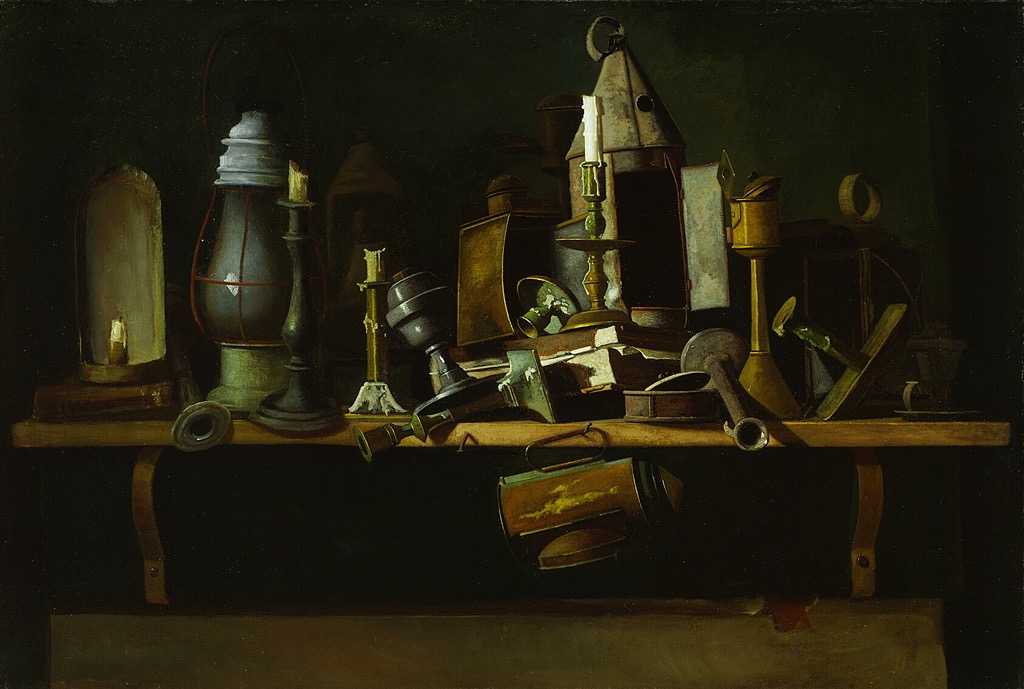
John F. Peto: Lights of Other Days (1906)
" … something I'd never anticipated appearing …"
I realized mid-afternoon yesterday that my head had stopped screaming. As if a gale had ceased, I first noticed the glaring absence, the disarming silence. I took this change to mean that I had popped through to the OtherSide, that I might have weaned myself off both nicotine and the drug that was supposed to help wean me off it, the second challenge the greater of the two. That drug had hijacked my brain. It screamed in response, producing a distracting background sound almost dominating the foreground as well. It was, as passages go, more tedious than difficult. I came to appreciate how The Gods staged this one, though, recalling the drug so no fallback prescription could be filled, so the addiction could not continue beyond the reach of that final half dose. I first felt betrayed, then cheated, before finally feeling blessed that fate had left me no recourse. If it was left entirely up to me, I doubt that I would ever change anything. Oh, I'd talk big but eventually backslide in secret, thickening my story and widening the gap between my public and my secret selves. Sometimes, though, circumstances align such that some genuine change slips through my defenses. I never know how to behave then, after finding myself standing on some OtherSide.
I recognize that I serve as my very own best personal change prevention specialist.
Experteazing
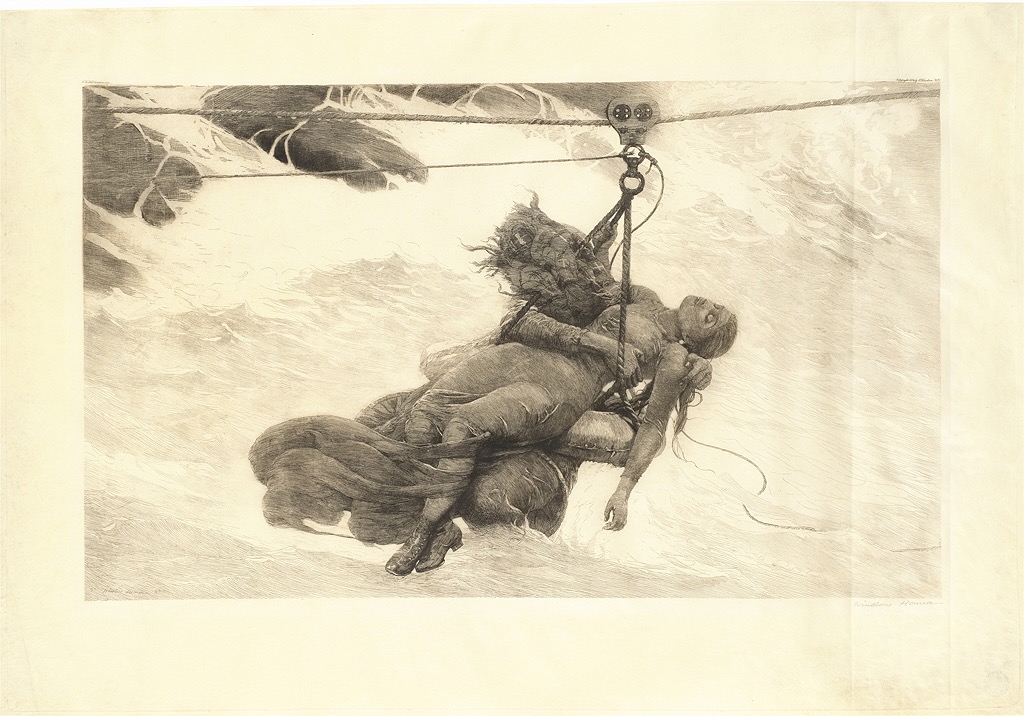
Winslow Homer: Saved (1889)
"I guess I want the mystery to persist beyond my intervention …"
Back when I still considered myself a consultant, I promoted myself by saying that I was "an expert at not being an expert." What skill was I hawking? My colleagues held impressive curricula vitae. I did not, yet my colleagues found my presence helpful in spite of or, perhaps, because of my lack of impressive formal orientation. Maybe I'd gained street smarts or perhaps, because of my lack of formal training, I just parsed the same old problems in unique ways. Maybe I was more of an expert than I sensed.
I never managed to codify what I knew or had experienced.
Blowin'ItUp
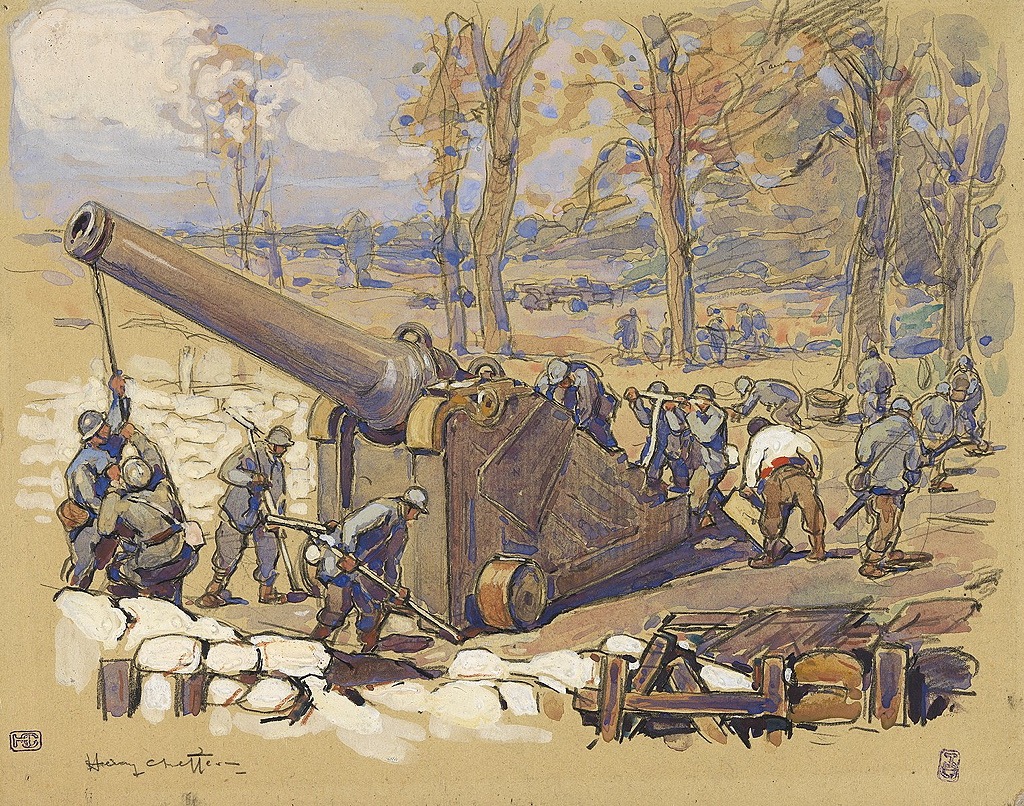
Henri-Lucien Cheffer: Soldiers and a Cannon (1915)
"'Twas always thus and still is."
Friday morning, 2am, I'd taken that remaining last half pill of the prescription I'd been given to help me break my nicotine addiction. I felt reasonably confident that I'd gotten past the worst of this withdrawal, eased by my patience, my common sense, and that prescription. I'd responded poorly to the drug at first, for it seemed to make my difficult situation worse, so I suspended taking it for a few weeks there in the middle, but as I began to feel more confident that I was successfully edging myself off the addiction, I reintroduced that medication into the mix. It hadn't made me feel so crazy that second round. I was down to just the drug, no secret supplemental placating the addiction. I'd ditched the source and had wisely left myself just this one recourse. When I reached the end of the prescription, I'd be done.
Halfway through that last day, though, I noticed myself sort of floating. My head was screaming something at me but my ears were fuzzy and I couldn't quite comprehend.
AttentionSpanning
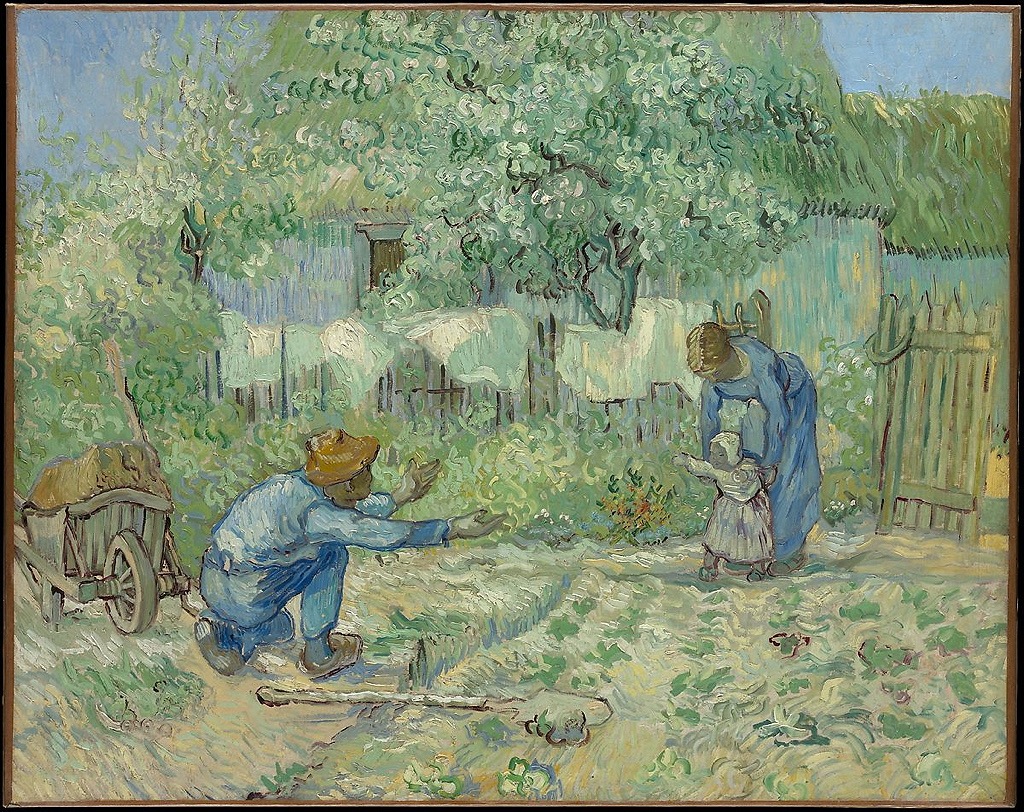
Vincent van Gogh: First Steps, after Millet (1890)
" … spanning a great chasm with my bottomless inattention."
Contemplating introducing direct dial service to the phone system, Bell Labs in the 50s sponsored a study to determine how long a phone number could be. People tend to have rather narrow memories. They might reliably remember five things consigned to memory but lose a few entries from a twenty item list. How long could a phone number become before most could no longer reliably remember it? The answer, one of the more famous and consequential answers in the annals of social science, turned out to be 'seven, plus or minus two.' This means that a phone number could be as long as nine digits without most people finding it impossible to remember. Better if it could be held to five digits, but still outward bound acceptable at nine. How long are phone numbers now? Ten digits, but ten made a little easier. Area codes almost don't count, since they tend to cluster around any individual location. Many people almost never dial another area code than their own, and many more restrict their calling to two or three adjacent ones, so the effective length of most phone numbers anchors at seven, perfectly within what the study suggested most would remember.
Some of us are more like dedicated threes on Bell Lab's scale, possessing well below average-sized iconic memories.
Paint

Johannes Vermeer: The Art of Painting (1666–1668)
"It's apparently never too late to try again to get closer to the ideal you'll never achieve."
HomeMakers struggle with no substance like they struggle with paint. Paint's different. It's permanent. Paint something, anything, and you produce a self portrait. Slopping it on produces a sorry legacy, indeed. It WILL outlive you. Mistreat it and it will mistreat you worse. One careless moment might haunt a HomeMaker forever. One fortunate experience might delight for just as long. A perfect cut between wall and moulding can appear every bit as exquisite as an Old Master's painting, and just a rare. No other substance offers so many ways to utterly fail when employing it. No other substance seems to somehow, at some time, end up in the hands of pretty much everyone. Who has not, poisoned by some slick promotional photo, decided to repaint some possession only to produce a regrettable result? Paint color cannot be reliably represented via photography. It varies by a thousand factors. It seems a subjective experience colored by context and preexisting preferences more than anything else. Paint remains a mystery to almost everybody.
Paint and I have history.
TheLastDay
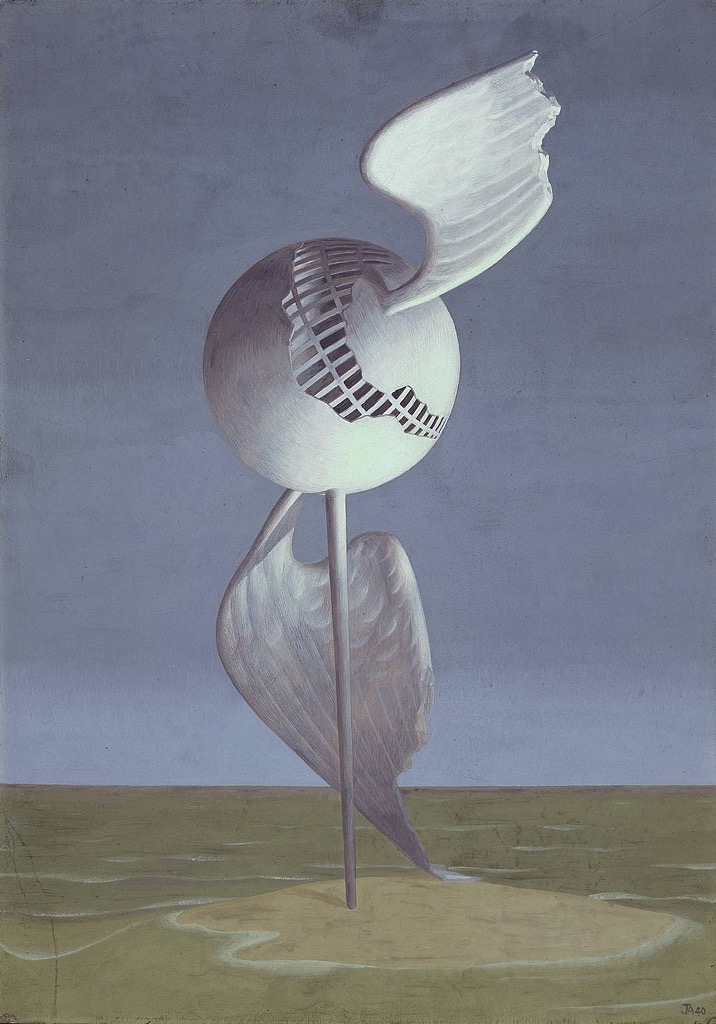
John Armstrong: Icarus (1940)
"Time to cut that old transition loose."
Today doesn't so much seem very much like the first day of the rest of my life, but more like TheLastDay of some soon-to-be former one. Refurbishing The Villa seems to have exacerbated this sense, for Our Painter Curt and I destroy something daily, each act subtly changing this context. It will never be the same again, again and again, such that I'm unsure just where The Muse and I are living right now. The end of our labor has not come anywhere near to being in sight. Nor can we really remember how it was just three very long weeks ago when we began this phase in earnest. We're suspended, former status quo shredded before us, stumbling forward, each day TheLastDay for something. No day a new day for anything yet, but a continuation of the perturbation, here to finish up what yesterday started and to destroy something forever again.
Many of the tasks I'm performing, largely little supporting roles beside Curt's star turn, are new to me.
Phublishing
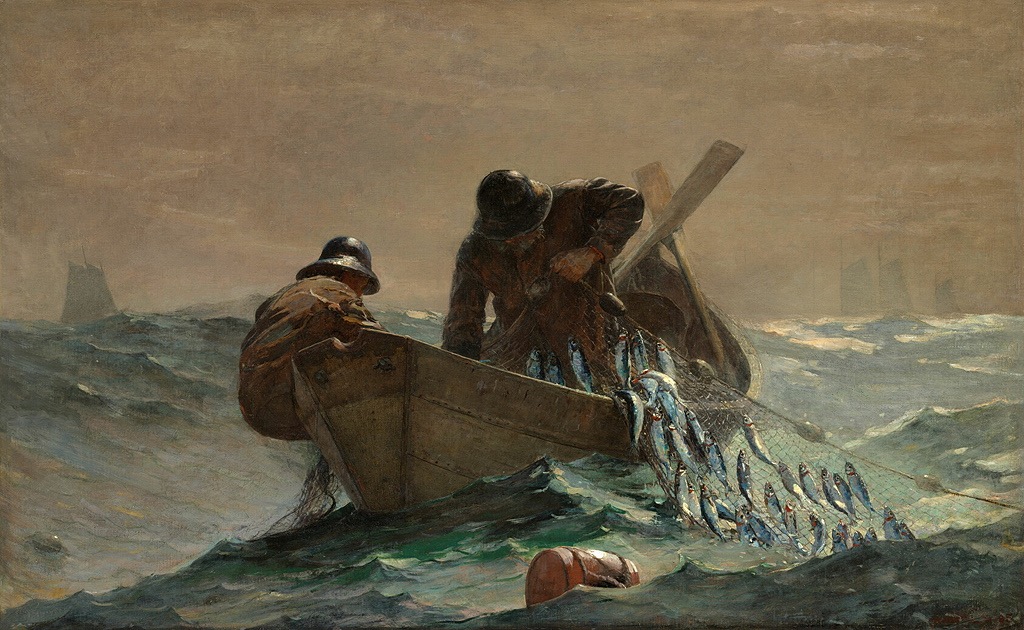
Winslow Homer: The Herring Net (1885)
" … maybe it was just meant to be precisely like this."
No news to anyone for me to declare that trolls live out there. A whole industry exists just to take advantage of others. The numbers of people engaged in this nefarious work seems to have increased through my lifetime, or maybe I've just grown more vulnerable as I've acquired possessions worth swindling. There are contractors who gleefully accept deposits then never show up to do the work. There are no shortages of deals that seem too good to be true, and are. Used cars. Lumber. Anything sold in the frozen food aisle. None of us are strangers to the charlatans circling our doors. Lies, damned lies, and statistics. Television advertising. Much of what passes as email these days represents phishing expeditions, others trying to harvest data you aren't aware you possess that someone, somewhere has figured out how to make an odd buck off of swiping. I willingly post to Facebook every morning, even knowing that they're plotting to do me in. I'm apparently being conditioned to cooperate in my own demise.
It should have been no surprise when that Phublishing company that recently contacted me out of the blue turned out to be untrustworthy.
CompleatIdiot
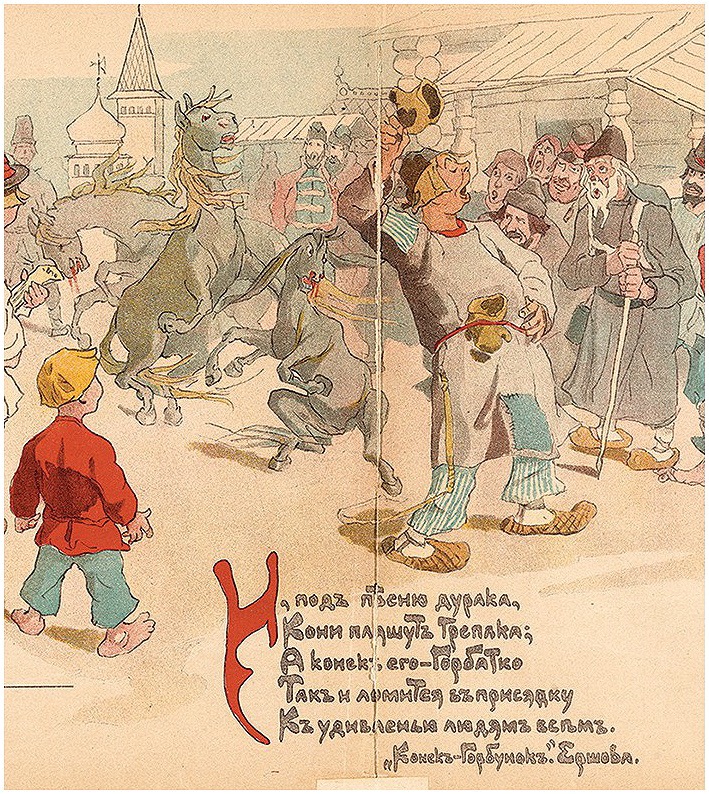
Illustration of a village idiot from The Firebird and the Fox: Russian Culture Under Tsars and Bolsheviks,
Freedom and the Fool (Chapter 1), Cambridge University Press, 2019 (Late 19th Century Russian)
"I remain grateful for how few brains are required to live the good life here."
Contrary to a popular misconception, I have not yet achieved the lofty label of CompleatIdiot. Oh, if only I could advance to that pinnacle, but I'm unlikely to ever get there, regardless of how diligently I pursue that goal. I settle for a more modest and fitting general idiot standing instead, one which serves most of the purposes of the CompleatIdiot status, anyway. I say that I'm not a CompleatIdiot without in any way intending to denigrate the native honor associated with the idiot designation, but to rather proudly include myself as a member in decent standing of this uniquely useful class comprised of the idiots of this world. Before I'd come to terms with just what an idiot I tend to be much of the time—not all of the time, mind you, for the ability to perform continuous idioting belongs only to CompleatIdiots—I'd try to hide my little secret as if it was really a secret to anyone watching me perform. An utterly fruitless effort, but one I still felt compelled to engage in, for I imagined that if others knew the truth about my native deep down idiocy, they might think less of me. My sense of inadequacy bloomed, anyway, for no-one successfully fools those in the presence of a genuine idiot. Only after I came to accept this secret as already public knowledge, did I start discovering its power.
The idiot holds advantage in innumerable ways.
Oftening

Anonymous: from New Impression: Children at Play, woodblock print book (ca. 1875)
" … maybe it's just me who's overseeing …"
Repeat any activity an uncertain number of times and besides acquiring a habit, you might discover boredom. We work hard to develop routines before setting out to revile them. Vacations have long been held as an antidote to too much sameness, though through This Damned Pandemic, vacations have proven chancy and easily foregone. We've escaped a few times in recent months to see my sons and grandkids, observing strict guidelines: wearing masks, waiting forever for the hotel elevator so only us two would be on it, eating take-out, avoiding crowds. The protocols seem just as tedious when away from home as they've become at home, and there's really no escaping them as another unsurprising surge overtakes us, this one apparently more virulent than any previous. Only one of my face masks remain intact after a year and a half of continual use. The other two have started splitting, an Oftening effect, no doubt, suffering from too much of what they were designed to do. There are apparently limits.
My weekend routine has been changing since we started remodeling in earnest.
Promoting

`Hanabusa Itchô. : "Blind monks examining an elephant" from Itchô's Freestyle Album (Itchô kyôga shû).
Niigata: Meguro Jûrô (1888) Woodblock-printed book.
"Is it my vanity that so soundly rejects seduction from the vanity penny press?"
A week ago, I missed an incoming call. I uncharacteristically called back to find myself trapped in a conversation I had not anticipated and in fact had been avoiding. The woman on the other end had been trying to contact me about republishing my best selling book under her company's imprint, though my The Blind Men and the Elephant (Berrett-Koehler 2003) remains in print. As she prattled on about the many benefits her operation offered, I recognized that she represented what's referred to as a vanity press, one where the author pays for publication of an edition destined to never sell. This one relies upon remarkably low prices—ninety-nine cents a copy—to entice people who might not ever read a book to buy it. Why not? A network of self-selected book reviewers each receive a free copy in the probable delusion that they might value that gift enough to write a glowing review of it. Tens of thousands of frequent ebook readers are likewise offered special give-aways and deals in an attempt to inflate readership into the noteworthy range. As I listened, I wondered how she'd gotten ahold of my phone number. I was on the phone with a junk caller.
I mentioned that I write four books each year and that comment seemed to perk up her ears.
Floating

Ichiyûsai Kuniyoshi: famous heroes of the kabuki stage--played by frogs (circa 1850-1860)
" … dreaming to make that dream come true …"
The upstairs hall ceiling had troubled our painter Curt from the beginning of his work. He wisely set aside his concerns through the first two weeks of preparation work. By then, he'd painstakingly sanded out and primed the bannister and knocked the high points off the walls, pulled baseboards in the entry hall and fixed every ding between the front door and the stair top. Then, our series of muted conversations about the ceiling came to something. He confessed that he could see no way around Floating the damned thing, a comment of which I didn't quite know its meaning, but I nodded gravely, as if discussing a sick child. Curt listed the alternatives, each of which seemed filled with shortcomings, but he wanted this to be my decision. HomeMakers sometimes find themselves in this position, as if a wise parent or something, called to decide about something they have no clue about. I asked him to describe what Floating might entail.
It would, as Curt described, require three sets of probably two hour stretches, poised atop his four footer, smearing goop over the present ceiling covering.
Cleanering

Jan Neumann: Monument to the Janitor (St Petersburg, 2007)
"Nobody later will notice."
Curt our painter and I try to run a tidy operation. We attempt to clean up the unavoidable messes renovating quite naturally produces. We keep a broom and a vacuum handy, even though we both know that we're fighting an inevitably losing battle. How ever much sanding dust we might manage to capture, at least that much remains even after we've finished cleaning. I've taken to dust mopping the walls after Curt spends a day sanding off the high points of an unfortunate gritty top coat some prior owner smeared over some of the plaster walls, leaving unsightly swirls. We're trying to render those walls minimally presentable, understanding that nothing short of replacing them with drywall could ever render them perfectly plumb again and The Muse and I want the age of this place to show through the new paint. We're not erasing history, just taming it a bit. Taming history's messy business with some new form of detritus appearing daily. Each presents a challenge we cannot completely mitigate, but we attempt to keep up with cleaning up lest we accidentally overwhelm ourselves.
Such Cleanering belongs to that special class of apparently meaningless work, effort that will either make no apparent difference or be shortly erased, but which absolutely must be accomplished.
ColdFooting

Jan Gossart: Christ on the Cold Stone (1527)
"I'll be contributing by ColdFooting every damned inch of the way."
It all seemed like a great idea at first, last March, before we'd attempted to move back into The Villa Vatta Schmaltz after a twelve year absence. We mustered an I Know, We Could Put On A Show!-quality bright idea and set our expectations on refinishing 3/4 of the floors and repainting even more of the walls. We tried to be prudent with our move-in, leaving many boxes packed and many in areas not slated for renovation, but still, we unpacked plenty that will need relocating as our renovating proceeds at a pace considerably faster than the average snail's, but of course more slowly than we'd earlier imagined. What might have been slight inconvenience appears likely to become our lifestyle until we're in the shadow of Christmas. I'm guardedly confident that I might finally unpack my books by the new year, which will almost mark a year since I started boxing them up for that big, final move. The year's been spent somewhere between there and here.
The floor contractor came yesterday to survey the upcoming job. He entered a foyer partially prepared for painting to the smell of prime coat finally spreading on the long-sanded bannister.
Doorable
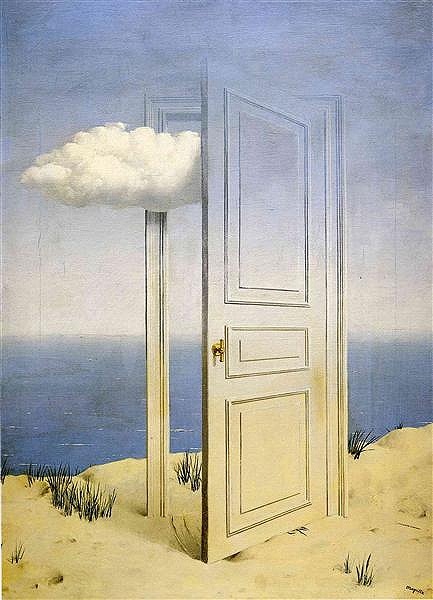
René Magritte: La Victoire (1939)
"I sign my name on the bottom of the ones I've finished just as if I was some famous artist or something …"
On my better days, I believe that everything in this world is here to serve as my teacher. On my best days, I actually catch myself practicing this foolishness. It's not mere foolishness, though, but one of those beliefs that to hold it makes it come true, which makes it a very special sort of belief, indeed. With a run-of-the-mill belief, both ideation and execution lie in the believer and perhaps a few fellow followers. It's a baby bubble operation that only works with considerable delusion. My belief about everything being my teacher requires no delusion and no more than a mustard seed of faith because it's really more about my acceptance of my role as student than about any teacher or lesson plan. One never knows what might become the subject of the next lesson or what might appear in the role of teacher, but only the willing student gains the benefit.
I am not universally recognized as a willing student.
Rhythming
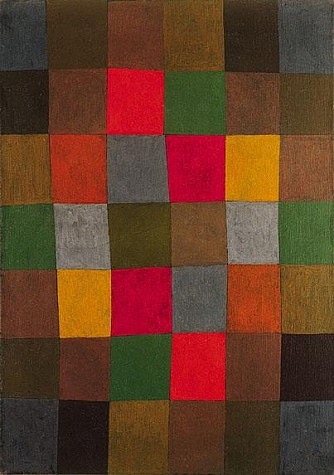
Paul Klee: New Harmony (1936)
" … just as if I might one day somehow qualify to be a professional myself."
The first week or so, I just sort of followed Curt The Painter around. I'd assigned myself as his dog'sbody, available to stoop, carry, fetch, and clean up. Since I was also The Client, this self assignment might have made things feel awkward, but Curt and I are old friends and I made my role explicit. I directed some work, like removing windows, while also assuming responsibility for some work, like refinishing windows, doors, and baseboards. By the start of the second week of work, though, my role had matured into a growing independence. I had my pop-up paint shop out in the driveway and Curt had the entry, stairway, and upstairs hall to prep. He didn't need very much help from me and I became distracted feeling my way into fulfilling my responsibilities. Curt was directing me, at my continuing insistence, for I wanted my contributions to pass muster, as if a real professional had completed them, so I sought continuing direction. I didn't always understand. I'd finished the final coat on the baseboards yesterday when Curt noted that we'd had a slight miscommunication. I'll be sanding some of the final coat off those boards today to properly reapply that last coat. I'm still Rhythming.
Rhythming provides cadence until the real backbeat kicks in.
BeatenPaths
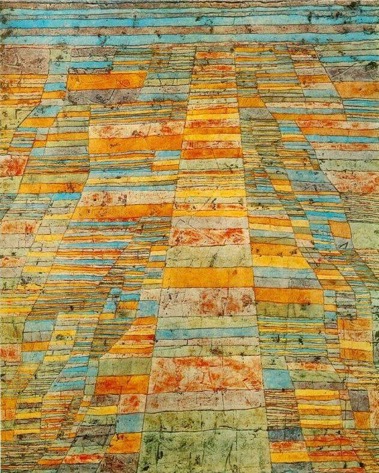
Paul Klee: Highway and byways (1929)
" … as if to try to compensate for what was sacrificed to become somebody else."
Four months after arriving back in the old hometown, The Muse and I conclude that there is no decent pizza to be had here. We add this to a growing list of unavailables and proceed. She compensated for the lack of pizza by making her own Pizza Bianca which easily bested anything we've ever gotten from any takeout and rivaled even New York City street pizza for texture.
One aspect of modern life baffles me.
Quittering
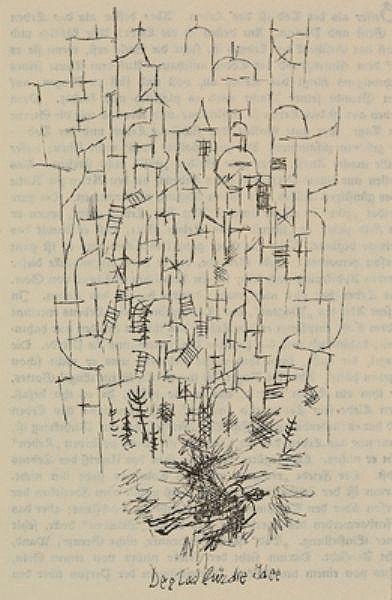
Paul Klee: Death for the Idea [Original Title: Der Tod für die Idee] (1915)
"The exit routes me through negative space toward an apparent vacuum."
Just over a month ago from now, as I was nearing the end of my SettlingInto Stories, I posted a story about being a quitter. In that story, I had started quitting the inconvenient habit of ingesting nicotine, a hyperactive nerve agent and mild sedative. I was doing battle by means of a counterbalancing hyperactive nerve agent, a psychoactive drug, apparently designed to make me temporarily crazy. The drug was working better than the quitting, though I had as the more dedicated addicts always say, "Virtually" quit. First by no longer carrying, then by no longer purchasing, while continuing crawling further and further out onto an ever-narrowing limb. I had not envisioned that limb's limits. Some days it seemed like I was crawling toward oblivion, which, I understand, amounts to a perfectly respectable and even an expected reaction when quitting. But quitting connotes a definite direction, like building up or winding down, not what now seems like perpetual around and around and around. I don't yet see an end in sight, when the recent hostilities might reasonably conclude and I get to go on enjoying what's left of my life.
The difficulty with doing without might be that it amounts to negative doing. It creates a vacuum.
Middling

Paul Klee: Twittering Machine [Original Title: Die Zwitscher-Maschine] (1922)
" … it's all about minding chickens."
There seem to be rather well-developed rules for starting and finishing things, but less distinct directions for what to do when in the middle of something. Perhaps those who create instructions consider middles more or less steady states requiring no description. I woke this morning to find myself in the middle of summer and felt myself startle at the recognition. Beyond the aspirations of spring and the easy appreciations of early summer, days have slipped into a routine, as if they were never different. The brown spots in the yard have definitively proven themselves incapable of greening, so I've stopped aspiring for them to green up. They'll rejoin the living after autumn returns. The garden's no longer becoming, but full-blown become now. It needs little tending and even less nurturing. The Muse reports an outbreak of squash beetles requiring complicated intervention involving diatomaceous earth and soapy dishwater. I'll let her handle that one. I'm busy Middling. Watering's found its schedule and hardly seems disruptive anymore. Days dawn and set with little variation. It's that part of the year when the melody suspends and the rhythm section tends to maintain the cadence; nothing's beginning and nothing's finishing, either.
I find myself in the middle of more than this season.
Fridaying

Paul Klee: Senecio [The Portrait of a Man Going Senile] (1922)
"I close one book so that I might open another."
I end my work week on Thursday. I work from Friday to Thursday with no days off. I take no days off because my work is my life and nobody takes days off from living until they take all subsequent days off, and I'm unprepared to do that yet, much less on a regular basis. Friday mornings bring a special responsibility. That's when I collate the passing week's production, reread every piece, and create a summary of where I've been. I post this summary along with a fresh piece, next week's first product. I work exclusively in circles.
Even on Fridays, I wake with little idea about what I might write.
Knowletch

Artemisia Gentileschi: Samson and Delilah, c. 1630–1638
"Experience doesn't come from cramming for the exam …"
Our painter Curt mixed the primer, thinning it as well as adding something to improve its viscosity to make brush marks less likely. I had prepped the entry hall baseboards, completely removing the rubber-based paint and sanding them smooth. I knew how to prep and paint, but under Curt's tutelage, I felt like an amateur. I asked if one of my old reliable brushes would work and he frowned before trundling out to his truck to fetch a more proper one. He did everything but tie my shoes for me as he handed me my paint bucket and a handful of rags. In any other context, I would have just painted those boards without thinking very much about technique or even outcome. I mean, I was just painting, no big anything for anyone. I knew how to paint. Or did I? Curt's fifty years of professional painting far surpassed my amateur experience. He even understood the underlying science behind every step in the prepping and repainting process. It wasn't just a hobby for him, as it had always been for me. I realized that my innocent ignorance far exceeded my knowledge about this subject, and so I quietly acquiesced to Curt's superior understanding.
I hesitated before applying that first brush stroke.
Solituding

Leonardo da Vinci: Saint Jerome in the Wilderness (c. 1480–1490) Unfinished
"We leave slug trails of surreptitious accomplishments behind us …"
Most HomeMaking happens alone, not precisely in isolation, but certainly in solitude. Attempts to soften the resulting loneliness mostly fail. The Mower's too loud to allow listening to the ball game. So's the sander. Painting might prove too exacting to be done while in any way distracted. My ear buds sit largely unused in the bottom of the right front pocket of my Handyman Dave jeans. Most of my chores seem best done alone. Barn raising's a once in a lifetime situation. Few tasks need cooperation and many seem so mindless that they might threaten sanity if over-engaged in. One must ration efforts lest they steal a dimension from you. Long days doing the same damned thing does not produce anything very interesting to talk about over supper. What's new? Nothing.
All that said, I find HomeMaking's necessary Solituding reassuring.
Destructing
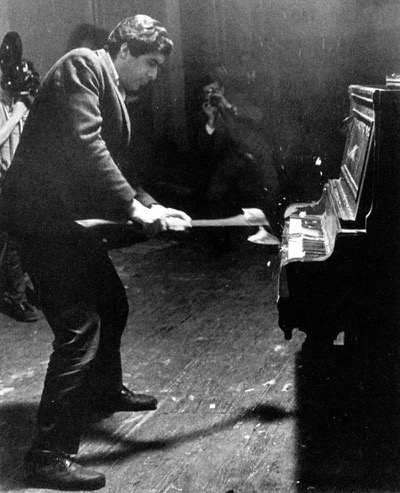
Raphael Montañez Ortiz: 'De-Struction Ritual, Henny-Penny-Piano-Sacrifice-Concert', 1967, performance
" … a true craftsman, self-improving my self-destructing, almost machine, marvelously more human."
I never feel closer to The Villa Vatta Schmaltz then I do when I'm Destructing something here. Our painter Curt and I pulled out a couple of double hung windows and I felt like I really owned this place. Removing doors empowers me, but cutting away wall-to-wall carpeting and pulling up the underlying tack strip, that work liberated me. There will be no reinstalling that carpeting I cut, no attempt to put any Humpty Dumpty back together again. I could have and might have just uninstalled that carpet except I wanted to keep a soft-padded walkway during as long of the repainting effort as possible, so I just cut back a few inches of the edges, enough to gain access for prepping and painting trim. The flooring contractor has not yet been by to advise, anyway, so I hold my ultimate Destructing skills at bay for now. For now, but not forever. I so carefully preserve so much here, but given half a chance to utterly destroy something, I feel even more the successful steward. Maybe homes, like fruit trees, need steady pruning, removing some portion of whatever's accumulating on some regular basis. Scorch a corner of this earth and it seems to become more alive, to thrive, an apparent paradox of HomeMaking.
Weeding the garden carries a similar remit.
ReImprinting

The Planet Mercury as a Doctor on Horseback,
Miscellany: Anatomical-Physiological Description of Men;
Liber Synonimorum; Descriptions of Planets, Zodiac, and Comets;
Treatises on Divination from Names, etc., German (shortly after 1464, Ms. Ludwig XII 8)
" … apparently finished ReImprinting upon our new home."
Portland's not my town anymore. Oh, I still know my way around the East side, but now only as a vaguely interested visitor rather than as a resident booster. I began as a booster. I found it quaint, more accessible than Seattle had been, more a large rather than a full-blown BIG city. I limited my experience of it to immediate necessity, only very rarely leaving the downtown and Central East Side, bounded by Lloyd Center and Sellwood, the West Hills and Mt. Tabor. Most of the West side of the place never existed for me and I scrupulously avoided it as confusing. I worked downtown. I lived just across the river. I never in nearly thirty years there, ever commuted by car. I proudly rode the bus. I treasured the libraries and the bookstores. I casually shopped the big downtown department stores as if they were mine. I had come from a much smaller city, but I'd ReImprinted upon that larger one. I'd retreat back to my hometown some weekends, but without seriously considering moving back there where opportunity seemed to have passed it by. Maybe a great place to retire or to have come from, but no place for a career.
Sunday afternoons, I'd head back to West of the Mountains without very often checking my rear view mirror.
HisStory

Columnar-blocky jointing basalt, Frenchman Coulee, west-central Columbia Plateau, Washington (photograph by Terry Tolan)
" … homesteading beneath this grass."
The morning reached out and enveloped me. We were toodling, our first real diversion from our regular routes since returning from our exile. We could conspire to tend ancestor graves, a chore that went begging during our absence. One corner of my mother's family arrived late to claim their section under The Homestead Act. Their piece of Oregon was not located anywhere near the Eden portion of the end of the Oregon Trail, but short of The Cascade range in rimrock country. Even today, that country is more sparsely populated than it was before the European settlers like my ancestors came. They came to claim their part of the American Dream, which must have seemed more like a nightmare to them at times. Evan and his lovely wife Sarah (nee Jackson) Wallace, who was the spitting image of my mother in her later decades, came west not by wagon train but by the Northern Pacific and stagecoach. They waited out their homesteading claim working for a family who'd already improved theirs, living in a tent on the property through their first Western winter. They lost two sons to diphtheria, leaving my great grandfather as their oldest heir.
We drove what must have been the trail Evan and Sarah took up to finally perfect their claim.
Ordersing
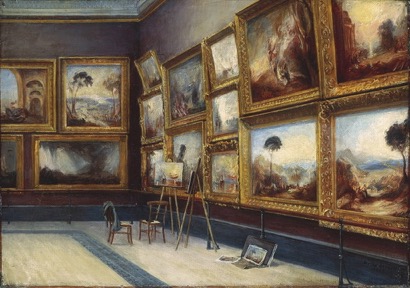
Bertha Mary Garnett: A Corner of The Turner Room in the National Gallery (1883)
"I'm learning to consider in what order of work I am engaging."
Change comes in several guises or 'orders,' typically referred to as first through fourth order change. First Order Change involves little more than planning and execution. Second Order does First Order one better by considering, for instance, how one might improve the means of planning or executing. Third Order Change might consider the problem as the solution to the difficulty, like when after failing to counsel a teenager, the parent concedes and 'lets them have their way,' figuring they might better learn through headstrong doing than by even emphatic supervision. Fourth Order Change might revise the rules under which change gets attempted. Running around with scissors might come to be recognized as a perfectly normal activity for some, rather than a certain pathology needing definite fixing. It matters how one perceives their problem space. First Order Change strategies have little effect in situations where fundamental assumptions underly an undesirable situation. Installing new linoleum cannot resolve most marriage difficulties, regardless of what the Sunday Supplement advertisement might claim.
I mention this Ordersing here because a similar framework probably influences HomeMaking, too.
UnSeeing
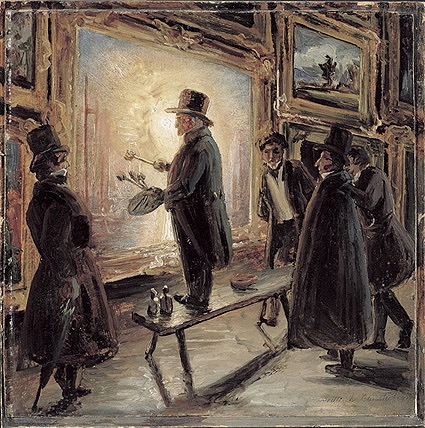
Thomas Fearnley: (Joseph Mallord William) Turner Varnishing [Norweigan-Turner Fernisserer] (1837)
" … the impression might seem have been rendered by a three year old with a broken crayon."
As our painter Curt and I disassembled The Villa's entry hall for repainting, I began noticing features I swear I'd never before seen. Curt found a hook screwed into a ceiling corner I'd walked under at least ten thousand times without once noticing its presence. I might have just been seeing that same old space in a new light because we had taken down that horrid chandelier The Muse had always loved to hate. I puzzled over how the ceiling interfaced with the second floor and which spaces were foreground and which trim, a question that had never occurred to me to ask until then, poised like Christopher Robin sitting not quite half way up or down the stairway. The thing about seeing, I started thinking, seems to be that it involves an awful lot of projecting. Initially, perhaps, I might quickly see before categorizing and classifying whatever appears before me, in this instance, "Stairs." I then start UnSeeing details as they become unseen again, framed but essentially invisible. This facility generally works just fine for me. It allows me to wander all around The Villa in predawn darkness without needing to turn on any lights. It also seems to inhibit my ability to foresee, though, to envision future difference, for how can I expect to repaint surfaces I cannot actually see? Repainting seems to insist upon a fairly tight interface with whatever's really before me. My shorthand classifying manner of seeing serves me poorly then, for it seems to actually be a dandy way of UnSeeing.
The thing about drawing, insisted Betty Edwards, author of the fantastic Drawing On The Right Side Of The Brain (Tarcher, 1979) and host of the DrawRight website exploring its insights, it depends upon seeing.
MythedInformation

Rembrandt: Judas Returning the Thirty Silver Pieces (1629)
"Those who seem most righteous might just be those most infected."
As we today begin prepping interior walls for painting, I remember a time nine years ago when, filled with MythedInformation, I set about stripping and repainting The Villa's exterior. I'd given myself a month and figured that I'd probably work alone. I had researched, or searched, what I might need to succeed, but I'd consulted with no expert in the field. I'd found and tried to purchase a used Silent Paint Remover®, a six hundred dollar implement which was reputed to ease paint removal. When I arrived at the seller's place, a lovely Northern Maryland horse farm worthy of Kentucky Bluegrass Country, the seller reported that she could not get the thing to work and decided to just give me the damned thing. She could not bear to sell something that wasn't operating. Later, my step-son and son-in-law repaired the electrical switch with an eighty-nine cent replacement bought at the local Ranch Supply. The paint remover worked better with two involved and my brother generously volunteered to help. Then his wife appeared along with his step-son, and a friend drove down from Spokane to help construct scaffolding around the gazebo. My mythical, independent, one-man project became a memorable communal effort. No man ever was an island, and not even a half-decent isthmus.
I'd also gotten the notion that the siding needed remoisturizing.
ADoorInc
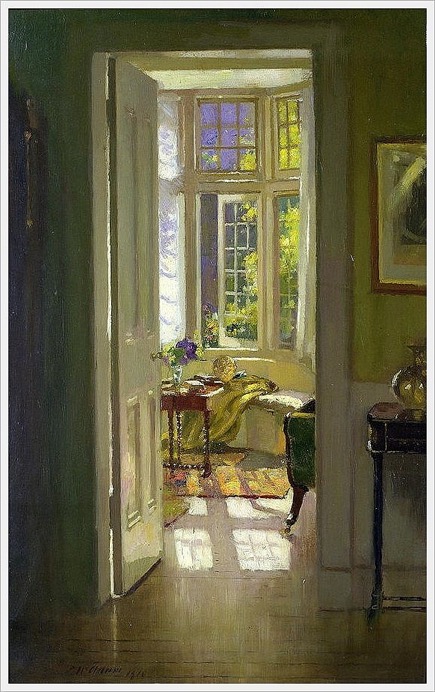
Patrick William Adam: Interior Morning (1918)
"I intend to paint in humble adoration, invisible masterpieces for the ages."
Like any old place, The Villa Vatta Schmaltz has a lot of doors, twenty, depending upon how I count them. A few must be original to the place for they're exercises in mortise and tenon joining, their heritage obvious by looking at their edges. Most seem of more modern heritage, but still solid five-panel doors, none of those hollow core abominations. Two appear irreparable. The rest need differing degrees of restoration ranging from simple painting to full strip, sand, prime, and finish. All need hardware stripped and probably replaced with brass. The painter visited yesterday and we roughly laid out the work before us. He approved our color palette and I took responsibility for the doors and two of the windows. I removed the first door last night, signaling the start of a significant side chapter in our overall restoration effort. I cleaned out the garage to make way for my door factory wherein I will refinish a dozen doors over the upcoming weeks. I'll erect a pop-up tent over a tarp, move in my saw horses and a work table, then tuck down my head and start refinishing. I'm calling this operation ADoorInc, though it's incorporated in spirit only and strictly not for profit, quite the opposite. It will certainly serve as a significant expense in terms of both money and aggravation, but I loves me doors. I imagine that I'm not merely refinishing them, but adoring them: ADoorInc. Get it?
I suspect that by the time I'm halfway through this pile of doors, I might no longer or ever again adore doors.
Sorting

Henri Rousseau, “Tropical Forest with Monkeys” (1910)
"Organization achieved by endless sorting seems the very soul of HomeMaking."
HomeMaking seems about 90% Sorting. I'm forever shuffling something from here over to there then back again. I might explain painting as a Sorting of sorts, whereby I sort a can's contents. I could go on with analogies, but you've probably already gotten my point. HomeMaking is Sorting most all of the way down, like Ghandi's elephants and Prachett's tortoise. Moving In Day, the movers seemed incapable of following The Muse and my conflicting directions, resulting in stuff smeared all over Christmas and back. We're still Sorting the result. I yesterday sorted out the garage, a chore I accomplished by first sorting out the spaces behind the garage. There, a few hundred assorted bricks, pavers, and concrete blocks needed relocating out of my Cadillac Composter to somewhere else, hopefully a place where they would not be constantly in the way, or underfoot, as they say. I decided to hide most of the bricks beside the garage, a space that has needed Sorting for ages, the place where I store my ladders. I pulled everything out of that creepy space, spiders, possum poop, and all, and swept off the resulting mess before tidily stacking everything off to the side. Then I had to sweep up the mess, which included broken fluorescent light tubes someone had tossed in there. Then I began ferrying bricks with my Muck Bucket Cart, about twenty a load. I laid the bricks, five or six across, to roughly pave that space, sorting bricks by size, color, and condition. My judgement was fine-tuning as I sorted, noticing variation where formerly none had existed. By the time I'd finished, several hours later, I had gained a deep sensitivity to the subtler features of bricks. No longer merely leftovers, I'd taken full possession of them by then. They were mine!
My neighbor Larry peeked in to comment on the proceedings, but I didn't really hear what Larry said because I had fallen into a first class Sorting trance.
TheHandyman'sDilemma

Frans Francken the Younger: Mankind's Eternal Dilemma – The Choice Between Virtue and Vice (1633)
"TheHandyman'sDilemma seems, in this light, utterly normal."
As a HomeMaker, I fancy myself a Handyman. I ironically refer to myself as HandyMan Dave because I'm neither a handyman nor a Dave, Dave being what people call me who attempt to affect that they know me well, but don't. I am exclusively David to myself and to my intimates, and nobody's handyman, not really. I recognize the paradox within which this title places me. This label both materially misrepresents me and my capabilities, yet I still don what I just as ironically refer to as my HandyMan Dave uniform—worn, paint-stained jeans now open at one knee and a shirt featuring smears of every color of paint I've handled while wearing it over the past decade. I crown this suit with my trusty Muse-made havelock which is equally as stained as my shirt. When so garbed, I experience a fundamental mindset shift. No longer the philosopher, I become a simple laborer. I cease fretting over making meaning of my actions, and dedicate myself to acting, and most often to acting rather mindlessly. I pride myself on my discipline then. I put my head down and simply engage. I feel most like some sort of monk then, not precisely Zen-like, but similar except absent evident wisdom.
I maintain a cast of characters within me.
KittenMaking

Albrecht Dürer: Sleeping Lioness. (circa 1520s)
Notes: Owned by the Print room of the Warsaw University Library.
Burned deliberately by the Germans in October 1944 during the Planned destruction of Warsaw.
"The smallest things seem to matter most."
The Muse and I identify as confirmed cat people and have been since before we were married, when we were still living in that apartment complex overlooking the Willamette River south of Portland, where a ginger cat with a crumpled ear adopted us. I christened him Crash and he moved right in, in clear consensual violation of our renter's agreement's prohibition against pets. Crash didn't need us to domesticate him. He domesticated us, but I suspect his primary purpose was to encourage us to provide a safe place for him to become a kitten again. As a feral or abandoned or whatever he had been before he found us, he'd had to maintain a certain street toughness. He'd had to nurture his inner lion to live. With a home, he could let down his guard, sit in a lap, and become a kitten. I think of home in the same way now. If families exist to make people, homes exist to make kittens.
I keep telling Molly, our formerly feral female, that I'm turning her into a kitten.
Sidling

Pieter Breughel the Younger: Christ and the Woman Taken in Adultery (circa 1600)
When he meets the Adulteress, Jesus writes: "He that is without sin".
Based on a painting by Pieter Bruegel the Elder, in the Courtauld Institute Galleries, London (The Princes Gate Collection, 9), 1565, grisaille
"HomeMaking's not a solo occupation …"
I recognize myself as indecisive. I only very rarely directly confront any challenge, but choose, either by habit or nature, to obliquely approach sideways. This tactic doubtless leaves me looking indecisive, but I sense that I'm more deciding than choosing not to decide. I take my time. I'll take your time, too, without first asking. I seem to need some space to make up my disordered mind. I consider from several angles. I play likely scenarios. Exhausting those, I run through a few of the more prominent unlikely ones before finally engaging. I tell myself that I am not procrastinating, though any observer might feel fully justified in questioning my assertion. I take almost forever to get started, but once started, I tend to be all in until I'm finished. I do not give up my heart on whims. Once I agree, once I engage, I'm dependable and make my commitment. I just do not commit lightly.
I consequently shove a considerable bow wave before me.
BeingPrepared

J. C. Leyendecker: A boy holding a sword labeled "Be Prepared." Another person wearing a flag holds a shield behind the boy. The poster advertises USA Bonds and the Third Liberty Loan Campaign by the Boy Scouts of America. Liberty Loans and Liberty Bonds were used by the US Government to fund World War I. (1917)
" … they found that there was probably no adequate replacement for a sincere lack of preparation."
Despite a century of exhorting people to Be Prepared, The Boy Scouts, whether or not they survive as an organization, will be remembered as having been wholly unprepared to face the scandal that laid them low. They might have just as usefully insisted that people should Be Prepared To Feel Unprepared, since BeingPrepared most often amounts to simply acknowledging that one can never be adequately prepared. Build that Maginot Line only to later find that it defended against a past threat rather than a present one. The careful, almost ruinous preparations became more encumbrance than asset in the moment that mattered. I won't argue against preparation, just against over-relying upon preparation as an iron-clad defense, especially when iron cladding limits mobility to respond to the unanticipated. The German's Zeigfried Line defended no better than the Maginot did for the French. The ruins of both still stand as silent testaments to the paradox not even The Boy Scouts could avoid. Preparation might well prove necessary but only rarely sufficient. Some undeterminable portion of defensive energy might be better focused upon mobility in some utterly unforeseeable future moment.
Our best laid plans have been starting to show their vulnerabilities.
FatEhGue
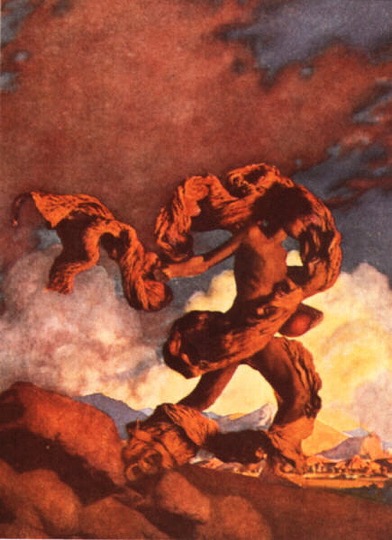
Maxfield Parrish: Cadmus Sowing the Dragon's Teeth (1908), created for Collier's
" … she asks me how it was out there. Miserable, I declare …"
I read a lot of comic books in my youth. My paper route left me rather affluent for a ten year old, so I could afford a few Baby Huey or Sad Sack comics, not to mention most every edition of MAD Magazine during its heydays. When I ran into a word I didn't know, I usually made up both a pronunciation as well as a meaning, and just continued reading as if I'd understood. Some words defy any eye's naive interpretation, the term for San Sack's uniform prominent among them for me. He wore fatigues, or FatEhGues, as I sub-vocally pronounced them to myself. I was uncertain what the term referred to. Perhaps Sad Sack's attitude, which he wore more prominently than he wore his uniform. It didn't matter. I always figured that whatever peg-legged interpretation I made when reading sufficed and might even prove superior to disrupting my reading flow to reference the real pronunciation and meaning. I still hesitate when I encounter that word, though, reverting to my first parsing before snapping back into my more mature understanding.
I've been noticing just how exhausting living beneath our current heat dome has become.
Fourth
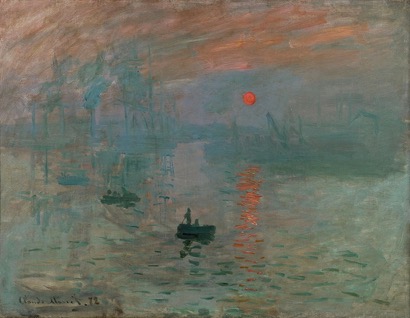
Claude Monet: Impression, soleil levant (1872)
" … a nation ruled by laws we steadfastly refuse to obey on the Fourth of July."
I baffled myself imagining how I might explain July the Fourth to anyone not native to the United States of America. I cannot quite explain it to myself. It tends to contain more mixed metaphors and mixed up factoids than all other holidays combined, yet it does not really count as in any way holy. It stands as our annual contradiction, a serial misrepresentation of our own history, familiar yet fuzzy, clear but curiously alien. Stand downwind of the business end of the typical July Fourth celebration and one might find themselves mistaken that we were celebrating some battle or something, so thick seems the smoke and smell of ozone and gunpowder, but history records no great victory or defeat on this date, just the founding of our country, which came as more of a whimper than an explosion. I might be committing the equivalent of Critical Race Theory here because I'm poking at the myth, looking for substance, a well-recognized crime against common decency.
I'll make no excuses. I've never liked how we celebrate our founding.
BigNSmall

A Mughal Miniature, Composition by Basawan, painting by Chitra for the left side of the illustration.Right side composition by Basawan, painting by Chetar:
Akbar riding the elephant Hawa'I pursuing another elephant (Ran Bagha) across a collapsing bridge of boats, 1561
from the Akbarnama. (circa 1590 -95)
" … that's how this world was supposed to work."
As empty nesters, The Muse and I mostly inhabit a world scaled for people who stand between five and six feet tall. At this scale, door handles seem perfectly positioned, toilets properly elevated, and mirrors more or less appropriately positioned. A city block's no kind of a walk, and a dozen easily bend to our will if we want. Either of two cars remain an option if we're in a hurry, even a bike. We live in a world scaled for us, a remarkable privilege, though we each remember when our world was not thus, back when it seemed to have been scaled for people much larger than us, a world which sometimes seemed hostile to our very presence. We persevered, matured, and more or less outgrew that humbling beginning.
I revel in nothing more than I revel in the presence of small people, adults still in waiting, the following generation, up and still coming.
MidSummerEvening

N. C. Wyeth: Jim, Long John Silver and his Parrot from the 1911 edition of Treasure Island
"The young ones now face even greater challenges …"
Poets and entranced travel writers have had their way with the MidSummerEvening until anyone might be easily excused for expecting them to seem romantic. I blame too many stars in way too many eyes and a gullible public, and also a distinct shortage of children in recent generations. Though I know I might well sound like the geezer I am when I insist that MidSummerEvenings remain the exclusive domain of kids, I will insist away anyway. Grown-ups, or purported ones, might find reason to sip some beer and shoot off a few illegal fireworks to celebrate a freedom they've unaccountably lost all track of, but kids, especially those not yet outgrown their age in favor of nihilistic pursuits like zombie movies and TicToc threads, own this space and always have. After supper's dispatched, which was a brief distraction at best, the kids take to the yard again as shadows start creeping in. It's still uncommonly though seasonably warm, and anything can happen within a kid enjoying the high that comes from a little too much hot dog chased with ice cream smothered in strawberries. They turn into pirates then and rampage through the long twilight hours. The best any grown-up can do is watch in wonder while perhaps helping to set up the tent in the backyard for the later sleep out.
It helps if the house has a circular yard, one which allows for unimpeded circumnavigation around the house, for as my wise niece noted, when (not if) that hose manages to soak you, running two or three trips around the world, and you're almost completely dried off.
Cut

Giovanni Francesco Romanelli: LivioAndronico [Ceiling in the Louvre Palace] (circa 1650)
"Our home's no masterpiece to anyone but us …"
When The Muse asked if I'd like her to paint the Cut in the basement stairwell, I gratefully accepted her offer. I'd been dreading that part of the job, since I'm basically a slob when painting and I usually only manage to create fine lines by using tape. I had not wanted to tape the freshly painted ceiling. I couldn't quite reach every inch of of the line and my ladder, which I could not open all the way on the narrow landing, left me feeling like I was balancing on the head of an unstable pin. She gamely scurried off to change her clothes, grateful for some activity not involving Zoom®.
A Cut line separating wall from ceiling seems the most bedeviling element of painting.
Permanence

Henri Matisse: Self-Portrait (1937)
"Drawing is like making an expressive gesture with the advantage of permanence." Henri Matisse
"I paint over inevitables."
I speak of Permanence without apparent irony, though I might be one of the most temporary entities around. My mailbox could outlive me, yet I undertake what I must clearly mistake to be permanent changes as part of my HomeMaking efforts. I contribute much impermanence, too. My lawn mowing undoes itself over the course of a week. Weeding might sustain for a month or longer. Watering, depending, might last for a day or two, seemingly always needing redoing. I rarely build anything permanent. I don't personally pour concrete, though I have directed others to do that to benefit this home, HomeMaking by replacing crumbling original replacements, which were intended as permanent replacements of the original pavement, which is long gone now. The house, subjected to one hundred and fourteen years of successive HomeMaking has proven more permanent than most of its parts. Inside, I doubt that the original owners and builders would today recognize what they'd wrought. The current front porch appears to have been built atop the original. Not even the original paint remains on the outside shell since I stripped it to bare wood, that and a few original windows.
Painting's about as Permanent as I get.
Turnings
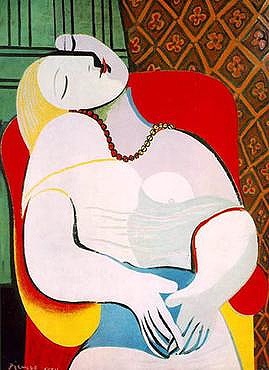
Pablo Picasso: Le Rêve (1932)
"It's never too late yet."
Neither a straight nor particularly narrow road, HomeMaking follows a meandering path. The past quickly fades after another seemingly inevitable turn and the way ahead remains largely obscured until just before the next future emerges. It's continuing surprise and anyone wandering there might easily lose heart, given the continuing lack of positive reinforcement. The sweetness in HomeMaking seems retroactive, occurring well after the bulk of the effort's concluded. For the duration of the excursion, aspirations fuel the engagement. Visions of imagined futures motivate continuing. It seems at root, faith-based by nature. Human nature might well prefer more tangible encouragements which remain only sporadically present. Discouragement seems most likely and might well prove deadly. Many abandon their dreams along the way. It seems extraordinary when anyone ultimately finds their way home, either again or originally. But then there are these turnings. Always the Turnings
I spent the first few days of this latest HomeMaking excursion in extremis.
Distinguishing

Auguste Rodin: The Fallen Caryatid Carrying Her Stone (Modeled 1881–82, cast 1902/24)
"HomeMaking is first about making the HomeMaker, then about making a home."
I'm unaccustomed to thinking of HomeMaking as a distinguished occupation, but like every occupation, HomeMaking involves making distinctions, Distinguishing. Considerable judgement also seems a necessary element of the effort, for a HomeMaker must do more than distinguish difference, but also determine if any intervention seems necessary and if so, how much. I imagine a huge chart denoting forms and degrees of engagement, something like:
If rough, smooth.
If smooth, texture.
And also listing the ten thousand primary elements of HomeMaking, but the pattern would quickly emerge as simple, and as fundamental as evolution:
If not right, fix or tolerate
If right, preserve or improve.
I catch myself in endless judgement of my surroundings, the better, I presume, to render them more properly like home. Not into Home but into more Home-like, an analogy. I perform this service by means of my Distinguishing. I exercise my judgement by first distinguishing. The quality of any resulting engagement feeds my judgement engine which might improve my Distinguishing. It all starts by noticing something. HomeMaking, like everything, utterly depends somebody first observing something.
There might only be five fundamental HomeMaking Distinguishing Elements: Context, Condition, Size, Shape, and Color.
Synapsing
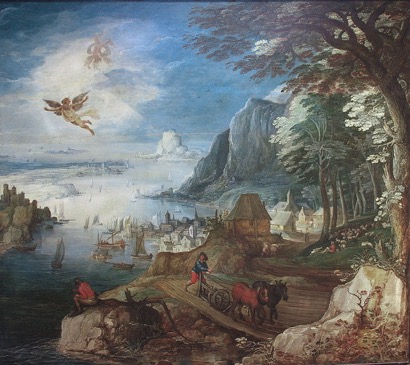
Joos de Momper: Landscape with the Fall of Icarus (circa 1620s)
" … as if Icarus had managed to fly around rather than a tad too close to the sun."
I feel as though I've flown a tad too close to the sun. Rather than tumble out of the sky like Icarus, though, I'm tumbling down through ether, imaginary space but always real enough before now. How would it be if one day you discovered that you could no longer access your intuition? No dumber than you ever were, but apparently lacking an essential connection that always reliably animated your processing before. Until then. You'd probably wonder if you'd ever recover that modest superpower again. Mine left under the influence of a certain prescription, one of those, increasingly common, which fiddles with Synapsing to fool some sense into changing. I suppose the drug's designer believed that it was just a switch, turned on or off, permanent effects unlikely. Fewer than .1% ever experience bradyphrenia, a "moderate" cognitive impairment, and I might or might not be experiencing it now. I just know that something's different. I can't even think crooked. Writing this small paragraph has taken several hours and not a second of that time seemed like writing.
I'm uncertain what to do.
Castling

Frédéric Bazille: Queen's Gate at Aigues (1867)
" … to let some inside out and some outside back inside again."
A man's home, long reputed to be his castle, stops feeling very much like home as soon as he starts using it as if it were a castle. I know, paradoxical. The problem seems to lie in the fundamental difference between home and castle. Castles exist first and foremost as defensive barriers, as fortresses rather than as commons, while homes, it seems to me, need to be open to mean anything. Closing up a home transforms it into a mausoleum, the sort of place only tell-tale hearts might ever inhabit. Whether in response to a heat wave or a snow storm, when a HomeMaker has to hunker in, his home becomes his castle and doesn't feel all that much like home for the duration of the defensive action. Castling ain't HomeMaking.
The Home-As-Castle analogy might apply to a whole class of human responses when exercising liberties or freedoms.
Dabbling

Andrea del Verrocchio: Baptism of Christ (1475) -- with an angel painted by Leonardo on the left
"Satisfied HomeMaking sometimes means Dabbling along behind."
I dabble in my duties as a HomeMaker. HomeMaking seems to be one of those occupations that do not quite qualify as an occupation and so cannot be properly considered a profession, and therefore cannot be mastered. No Master HomeMaker Designation could exist, if only because it would demand mastery of far too many elements. My first wife's mother held a master's degree in home economics, and not even she could take on every thing necessary to make a home, let alone to keep it humming. For wiring, she'd hire an electrician. She even retained the services of a professional housekeeper. A HomeMaker might be most properly characterized as a sort of chief contractor who coordinates the efforts without mastering many him/her self, except, perhaps, mastering the fine art of managing masters, though I suspect few ever approach even that level of skill. It's most likely, usually, amateurs attempting to coordinate the efforts of Journeymen, Masters, and other Rank Amateurs. Mastering that mess might be most of HomeMaking.
HomeMaking mostly involves Dabbling in a little off this and a little more of that other thing,
Perdiction
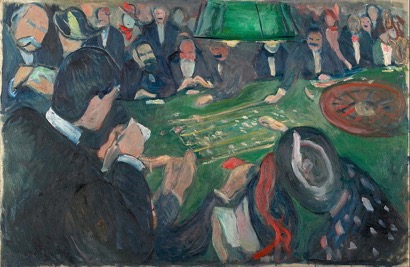
Edvard Munch: At the Roulette Table in Monte Carlo (1892)
" … underdelivering by means of over threatening myself again."
The weather forecast reads like a sentence passed down by a vengeful judge. I can't stop looking for the train wreck coming. I probably imagine it being much worse than it's likely to end up becoming. I remember a hundred and fourteen from when I was a kid. My mom laid out blankets on the front room rug and invited us all to camp out there instead of heading outside. We quickly fell asleep, waking after the fiercest part was over. As if that time created a precedent for future ones, grave predictions of soaring temperatures send me to ground. I hunker down and let the worst of it blow around me, or so I imagine. I focus my outside efforts to early morning or just before sunset and I hole up through the blazing afternoon. Before air conditioning, I'd flee to the basement. Even with the heat pump, lower floors seem preferable.
I wondered if the weather forecast was even accurate.
Flimability
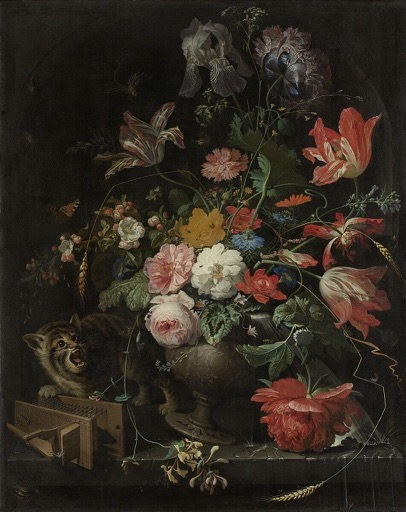
Abraham Mignon: The Overturned Bouquet (1660-79)
Reputed to be Mignon's worst painting.
" … seeing through and not just looking."
HomeMakers possess the oddest ability to see through certain imperfections in their home. Perhaps this results from a certain love blindness, the sort that automatically excuses a grandchild's unfortunate nose or a favorite movie star's indiscretions. We see right through some faults. When we first moved into this would-be home, both the basement stairs and the half bath and hallway off the kitchen were painted in the most awful electrocuted green color with garnish green striped wallpaper highlighting. While we were moving in, that same day, I removed that wallpaper and painted over (two coats) that offense to my senses in the hallway and half bath. The basement stairway, decorated the same, remained unchanged for twenty years. Yesterday, in under two hours, I removed every miserable shred of that wallpaper and purchased the paint to cover the electrocuted green wall color. While ridding this world of that abomination, I was moved to wonder how it was that I managed to cohabitate for two decades with what I could not tolerate even until the end of the first day living here? Explaining this as a form of blindness makes sense. Its presence had apparently not been registering all those years.
I seem terribly skilled at pulling wool over my own eyes.
Denizen
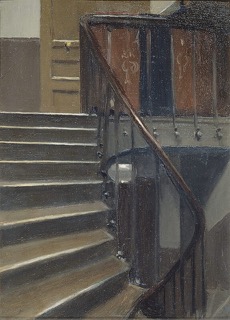
Edward Hopper: Stairway at 48 rue de Lille, Paris (1906)
"I often find myself wandering around the place apparently lost …"
I consider myself more Denizen than citizen. I know myself to be a Denizen of the small hours, for instance. For me, this home seems most homey between two and six each morning. By evening, I can barely relate to the place. Through the afternoon, I'm ready to run errands, nap, or read, escapist activities, but in the early morning, I'm present and accountable.
It seems that our homes make us Denizens of them.
BitRot

Abraham Mignon: Still life with rotting fruit and nuts on a stone ledge (c. 1670)
"It demands patience precisely when frustration might be peaking."
Software engineers hold that a program, left alone and never touched, will eventually exhibit some evidence of failure. They refer to this common phenomenon as BitRot, an exceedingly handy term and concept, since it describes the otherwise inexplicable. It serves as a placeholder for understanding and also as a reminder that an explanation does not always prove necessary to fix an error. BitRot serves as acceptance that a problem exists without ascribing specific blame for its emergence. Sometimes, things just fall apart without a discernible cause. Blame entropy if you must, but accept the difficulty and fix it if you can.
HomeMaking encounters plenty of BitRot in its normal routine.
CanningWorms
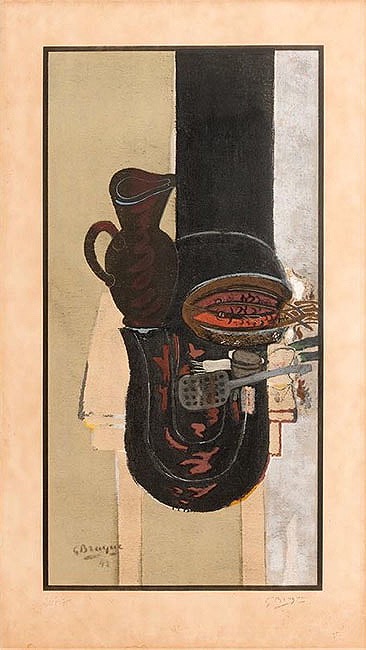
Georges Braque: "La Table de Cuisine" (1942)
"We're never through and we leave behind messes and we start new stuff before finishing the last …"
HomeMaking does not seem to qualify as a continuous process, for it features too many flow/stall cycles. Still, it seems continual. Many initiatives get started just fine but get stalled before completion, often for the most trivial reasons. A single missing screw has delayed completion of an otherwise trivial gazebo repair for two months. I'd been to the hardware store many times since and reliably forgot to get that screw. Last week, I bought a box of those screws, just to be sure I had enough, but haven't gotten around to actually using them. If I can find that box when the stars line up, I'll be in business. Until then, I'm backed up.
Each day brings a fresh batch of interruptions as well as new restarting opportunities.
StaleStart
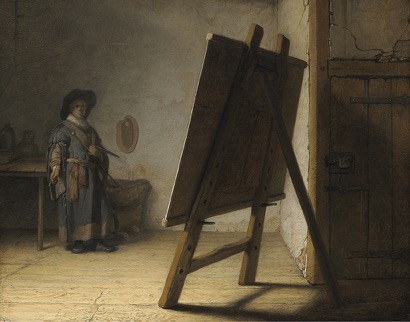
Rembrandt van Rijn: The Artist In His Studio (c. 1628)
" … delight, its deeper purpose."
We speak of fresh starts as if there could ever be such a thing. We speak of restarting, though these more accurately represent a discontinuous resumption with history trailing. I start a fresh series understanding that, by now, for me, any new series will seem at least somewhat stale. You see, I've done this before. Familiarity need not necessarily breed contempt, but it might well encourage wariness, especially with writing. That fresh-faced feeling a beginning brings probably won't last out the morning, and on this morning after summer solstice, the day promises sweat before midday and even more sweat through the afternoon. Still, I begin again, though I'm unable to muster that innocence I once just naturally brought to my game.
The art, if there is one, entails crafting a fresh supper from stale parts, like Tuscan Bread Soup, which combines fresh ingredients with stale bread to produce a delightful dish.


